THE COYOTE AND THE FOX
(San Juan Pueblo.)
O-way-way-ham-by-yoh, which means long time ago, a fox felt very hungry, so he went down into prairie-dog town and caught a fine fat prairie dog. Then he built a fire of dry rabbit brush. When the brush had all burned up and left a pile of coals, Mr. Fox took his prairie dog and covered him all up with the hot ashes. That was the way he always roasted meat for his dinner. It required some time for the prairie dog to roast, so Mr. Fox lay down and went to sleep.
Very soon Mr. Coyote came along. Sniff! sniff! he could smell meat roasting and it smelt very delicious. He saw Mr. Fox fast asleep; so he slipped quietly over to the pile of ashes, stuck his paw in and pulled out the prairie dog. He ran behind a bush and ate all of the meat off, but he left the bones. Then he took a bone and greased the fox's mouth all around with a greasy end of it. After that he put the bones back under the hot ashes and ran away.

Then he took a bone and greased the fox's mouth
When Mr. Fox awoke, he could smell prairie dog grease. He licked his tongue out and tasted grease all around his mouth. "Surely I have not eaten the prairie dog while I was asleep. No, I feel too hungry; but where did this grease come from on my mouth, if I did not eat him?" Mr. Fox was very much puzzled. He went over to the ashes and caught hold of a prairie dog foot and pulled. Out came a long leg bone without any meat on it. "This is funny," thought he.
Just then he spied some tracks in the sand. "Oho!" said he, "Now I understand it all. Coyote-man has played a trick on me and eaten my prairie dog. I'll catch him and kill him for this."
So Mr. Fox trotted off following the coyote tracks. He found the coyote by a high cliff. Mr. Coyote saw Mr. Fox coming and he knew he was angry. He did not have time to run away, so he just leaned against the cliff and called, "Oh, Fox-man, come here quick and help me! Look up there, this cliff is falling! It will kill us both!" Mr. Fox looked up. The clouds were passing over the cliff and made the cliff look as if it were really falling. Mr. Fox jumped quickly over by Mr. Coyote and leaned against the cliff just as hard as he could to hold it up. As soon as Mr. Fox leaned on the cliff, Mr. Coyote jumped away. He made a big jump, just as if the cliff might really fall on him.

Mr. Fox leaning hard against the cliff
"Hold the cliff up, Fox-man, while I go get a stick to prop it with."
Then Mr. Coyote ran away and left Mr. Fox leaning hard against the cliff.
Mr. Fox stayed there all day waiting for Mr. Coyote to come with the stick. Late that evening he looked up and there were no clouds passing, so he could see that the cliff was not falling. He knew that the coyote had played another trick on him, so he was angrier than ever.
Again he followed the coyote tracks and found the coyote down by the river.
When Mr. Coyote saw Mr. Fox coming, he called:
"Oh, Fox-man, come quick and see what I have for you. I found a cheese and I saved half of it for you; but it has fallen into the river. Look!"
And Mr. Fox looked down into the water. There was the reflection of the half-moon in the water. It looked just like the half of a round cheese and Mr. Fox's mouth began to water for a taste of it. He was very hungry.
"I wonder how I can get that cheese!" he said.
"I'll tell you how. Let me tie the end of this rope" — for Mr. Coyote had a rope all ready — "around your tail and tie the other end to this big stone. Then you can jump into the river and get the cheese. When you have got hold of it, call me and I will pull you out."
Mr. Fox thought that was a good scheme, so he let Mr. Coyote tie the rope around his tail and around the stone. Then Mr. Fox jumped into the river with a big splash.
As soon as he did, Mr. Coyote threw the stone in after him, and if the rope had not slipped off of Mr. Fox's tail when it got wet, that would have been the end of poor old Mr. Fox.
JUANITA, MARIANITA, THE CAT AND THE BEAR
(San Juan Pueblo.)
O-way-way-ham-by-yoh, the meaning of which you already know, an Indian man and woman had two daughters, Juanita and Marianita. Juanita was older than Marianita, so whenever their father and mother went to a fiesta — that is, a kind of picnic and dance — they always took Juanita and left Marianita at home with the cat.
One day the father and mother and Juanita went to fiesta to stay all day and all night. That afternoon when Marianita was cutting up meat to make a stew for her supper, the cat sat down beside her and begged for some of the meat. She gave him some; then she got him some water; she stroked his fur; and she did all sorts of nice things for him.
That evening when it began to grow dark Marianita was afraid; for there was no one in the house with her, you know, but the cat.
"Don't be afraid," said the cat, "You fasten the door and the windows tight and I will take care of you."
So Marianita locked the door and fastened the windows.
That night a bear came to the door and knocked. The cat peeped out through a crack to see who was knocking. He saw the bear — for cats can see at night — so he called out: "I am sorry we cannot open the door for you, Bear-man, but we are busy making a fire."
The bear waited a while and then knocked again. But the cat said, "We are making bread now, so we cannot open the door."
The bear waited and knocked a third time. "Open the door. I have presents for you." This time the cat called, "I am sorry but we are baking the bread and cannot open the door."
The bear grew tired of waiting. He tried to break the door down but it was too strong so he started away. Just then the cat opened the door and jumped out upon the bear's back. It startled the bear so, that he dropped the bundle of presents. The bundle fell open and the most beautiful jewelry and dresses and fine things that Marianita had ever seen fell out.
The bear was so frightened that he ran away and Marianita went out and gathered up all of the beautiful things. She dressed the cat up in a pretty little dress and some beaded shoes, that just fitted him. Then she dressed herself in a new dress and put on all of the jewels.

She dressed the cat up in a pretty little dress
When the father, mother and Juanita came home next morning, the cat ran out to meet them. They were surprised to see his dress and shoes and wondered what had happened. He told them, but they could not understand him. He told them again and they still did not understand, so they went into the house in a hurry to see what the cat meant. They were so pleased to see Marianita looking so fine that they hugged her up tight.
"Where did you get these lovely things?" And Marianita told them all about the bear.
The next time the Indians had a fiesta, Juanita let Marianita go with their father and mother. She wanted to stay at home, so that the bear could bring her some pretty things.
That afternoon, when Juanita was cutting up meat for her stew, the cat sat beside her and begged for some of the meat; but Juanita would not give him any. Instead she struck at the cat with her knife and treated him mean.
The cat climbed up on the window and went to sleep. When it grew dark and Juanita began to feel afraid at being all alone, the cat pretended to still be asleep. He did not say anything to her about the door and windows and Juanita did not think to fasten them.

That night when the bear came to knock on the door, he found the door unlocked, so he walked right into the house. Juanita thought he had come to bring her some fine clothes, so she said, "Good-evening, Bear-man, won't you have a seat?" and the bear sat down beside her.
"What makes your feet so big, Bear-man?"
"To walk the faster, little one."
"Well, what makes your nose so long?"
"To scent the keener, little girl."
"And what makes your ears so big?"

Juanita talking to the bear
"To hear the better, my dear."
"What makes your eyes so bright?"
"To see the farther."
"What makes your teeth so long?"
"To eat you up."
And the bear ran away with Juanita to eat her up.
But when the cat saw how Marianita grieved for her sister, he ran to the Bear's den; jumped on the back of the Bear's head; scratched out his eyes and took Juanita back home again.
THE OLD LADY FOX AND THE OLD HEN
(Nambé Pueblo.)
Once upon a time there lived near Nambé, an old Lady Fox and an old Hen. This old Lady Fox lived in a cliff and the old Hen lived in a hut nearby. Of course, they appeared to be friendly; but at the same time, old Mrs. Fox was jealous of Mrs. Hen, because the hen was more industrious than she was, and she often thought what a delicious dinner Mrs. Hen would be. Each of them had six children.
One day Mrs. Hen decided to give a dinner party for her friend Mrs. Fox and the little foxes. She killed all of her own children but one. This one she kept to run errands for her. Then she put her chicks on to boil and made a big pot of chicken stew. Afterward she made a delicious corn meal pudding.
The foxes came and had a merry dinner. "Please

The foxes came and had a merry dinner.
put all of the chicken bones back into the dish when you finish," politely asked Mrs. Hen; "and please you go, my little chick, into the next room and bring me my magic rod." The little chick hurried back with the rod. Mrs. Hen took it and struck herself across the nose. Instantly an empty dish was full of piñon nuts for dessert, which the greedy foxes soon devoured.
"Come with me now to the river," invited Mrs. Hen.
There she threw the chicken bones into the water and at the same time, she threw in some sacred corn meal as she repeated an Indian prayer, "Pee-pee sah-key, my children come out of the water." Then all of her chickens came out of the water safe and sound. All this time old Lady Fox watched her friend very closely; for she intended to do just as Mrs. Hen had done, when she returned the dinner party.

Then all of her chickens came out of the water
The very next week Mrs. Fox invited Mrs. Hen and her baby chicks to dinner. She killed all of her baby foxes for a stew. She even forgot to leave one to help her. She cooked the stew only half done and made a soggy corn meal pudding. When Mrs. Hen and her chicks arrived, they could only eat part of the dinner; for it was so poorly cooked.
"Put the bones back into the dish," said Mrs. Fox.
Then she got a stick and struck herself across the nose, as Mrs. Hen had done, to fill the dish with piñon nuts; but no nuts came. Instead she struck herself so hard that the blow made her nose bleed. Mrs. Hen and her chicks wanted to laugh; but they did not dare. They had to look down and hold their breath to keep the laugh inside.
"Now we shall go down to the river," said Mrs. Fox. And down at the river she threw the little fox bones into the water, and called her children just as she had seen Mrs. Hen do; but the little foxes did not appear. She called and called; and finally she grew so angry at the chickens, that she jumped at them to catch them and eat them up. But Mrs. Hen and her chicks were too smart for her. They jumped also and flew away. Old Lady Fox flew into a rage; she screamed and rolled herself over on the ground; then she clawed the ground until she wore her claws all off; and finally she bit rocks until her teeth were all broken off. She had no babies, no claws and no teeth.
THE COYOTE AND THE TURTLE
(Hopi, 2nd Mesa.)
Early one summer morning, once upon a time, when the ground was cool and damp, a turtle crawled up out of his home in the river. He crawled along hunting things to eat. He found so many good things that he crawled farther and farther away from the river. He forgot all about old Father Sun, who would come peeping up over the hills after awhile. If he had been a wise little turtle, he would not have wandered so far away from home. River turtles have to keep themselves damp. If they become too dry they cannot walk, and if the sun shines too hot upon them, they die.
Now while this little turtle was trudging slowly along, the sun came up and shone right down upon him. He turned around and started back to the river; but turtles travel so slowly and the sun was so hot, that he could only get half way there. When he saw what trouble he was in, he climbed into a shady hole in a big rock and began to cry.

He climbed into a shady hole in a big rock
He cried so hard and so loud that a coyote, who was passing near by, heard him. The coyote's ears were not very keen so he thought it was somebody singing.
"I must find out who that is singing," said Mr. Coyote, " and get him to teach me that song. "
So Mr. Coyote peeped around the rock and found the turtle with big tears in his eyes.
"Good-day," said Mr. Coyote, "that was a nice song you were singing. Won't you teach it to me?"
"I was not singing," replied the turtle.
"I know you were, for I heard you and I want to learn your song. If you do not teach it to me I will swallow you whole!"
"That cannot do me any harm," said the turtle, "for I have a hard shell that will hurt your throat."
"Well, if you do not sing for me I'll throw you in the hot sun!"
"That cannot harm me either," said the turtle, "for I can crawl under my shell."
"Well then," said Mr. Coyote, "I will throw you into the river if you do not sing."
"Oh, please Coyote-man do not throw me into the river. I might drown if you do. Please do not throw me in!"

Mr. Coyote threw the turtle into the river
"Yes, I will!" and Mr. Coyote took up the turtle in his mouth and threw him into the river
The little turtle swam out under the water where the coyote could not reach him. Then he stuck his head up out of the water:
"Thank you very much, Coyote-man, for throwing me into the river. This is my home. I had no way to get here. Thank you for helping me."
And old Mr. Coyote trotted away very angry.
THE FOX AND THE TURKEY
(San Juan Pueblo.)
O-way-way-ham-by-yoh, long time ago, a fox went out to hunt. He had such a good place to hunt in, for just north of his den was a stretch of woods, where wild turkeys and many kinds of animals lived. He and Mrs. Fox had been living on cow sinews for many days, so he was hungry for something different to eat.
He hunted for a long time until he grew tired. When suddenly he found — what do you suppose? — a big fat turkey. He was just ready to stick his sharp teeth into the turkey to drag him to his den, when the turkey said; "Wait, Fox-man, are you ill, you look very pale? You look as if you will faint. Don't you want to take a nap? You lie down and go to sleep and I'll go down to your house and tell Mrs. Fox to cook me for your dinner. Poor fellow, you look so weary!" This made Mr. Fox really feel ill.
"That will be kind of you, Turkey-Man."
So the turkey started off towards the fox's den and the fox watched him until he reached the door, then he lay down under a tree and went to sleep.
When the turkey reached the door of the fox's den, he knocked loudly.
"Who's there?", asked Mrs. Fox.
"Just a friend with a message for you."
"Won't you come in?"
"No, thank you, I am in a hurry. Mr. Fox asked me to come by to tell you that he will be back soon. He is very hungry and wants you to cook him a mess of cow sinews for his dinner."
And then the turkey ran away.

Then the turkey ran away
Mrs. Fox got busy and cooked some cow sinews. Very soon Mr. Fox came home smacking his lips. He was so pleased to think what a delicious turkey dinner he was going to have.
Mrs. Fox brought the dinner and set it on the table before Mr. Fox. He bit off a big piece and began to chew.
"This is the toughest turkey I have ever tasted," said he. "It tastes more like cow sinews than turkey to me. What is the matter with it?"
"Turkey!" exclaimed Mrs. Fox. "Why I have no turkey! These are cow sinews. Some one knocked at the door this morning. He told me you were hungry and wanted me to cook cow sinews for your dinner right away."
"Oh," groaned Mr. Fox, "that must have been the turkey!"
THE ENVIOUS COYOTE
(Hopi, 2nd Mesa.)
Once there was an old coyote with five ugly, snarling baby coyotes. They lived near a deer, who had two pretty spotted baby deer, called fawns. One day Mrs. Coyote said to Mrs. Deer: "How pretty your fawns are, Mrs. Deer. How did you make the spots on them? I should like to make my babies spotted too."
"Oh, I smoked them with corn cobs. I made a fire of cobs in my house and as soon as the house was full of smoke, I shut my babies up tight in there and let them stay all night. Next day they were spotted, as you see."

He pushed the five little coyotes in and shut the door
So Mrs. Coyote found a lot of corn cobs and built a fire with them in her den. When it was full of smoke, she pushed the five little coyotes in and shut the door tight.
Mrs. Deer took her fawns and set out in a hurry for the deer's house on a high mountain near Flagstaff; for she knew what would happen to the little coyotes and how angry the old coyote would be. She also knew that Mrs. Coyote had been waiting for an excuse to eat her and her babies up.

Set out in a hurry for the deer's house
On their way the deer had to cross a river. When they reached the river, the old turtle-man, who always ferried people across, took them safely over on his back. "Turtle-man, very soon a coyote will follow us and ask you to take her across the river. Please keep her here as long as you can, so we may reach the deer's house before she catches us and eats us up."

Old turtle-man took them safely over
The next morning when the deer had almost reached the deer's house, old Mrs. Coyote was back at her den opening the door to call her babies out. When the door opened, the smoke blew in her face so thick that it almost blinded her. "Come out, my beautiful spotted babies! We will eat up those spotted fawns some day and then you will be the only pretty children here."
But the little coyotes did not come. Mrs. Coyote went in to see why and she found them dead. The smoke had smothered them to death. She was so angry that she ran as fast as she could, following the deer's tracks to catch them and eat them up. When she reached the river the old turtle-man was digging in the ground and singing a song.
"Hurry, Old Turtle-man, and take me across the river; for I have no time to waste here!" yelled Mrs. Coyote. But the old turtle-man kept on digging until he had finished his song. Then he took the coyote on his back to carry her across, and when they reached the middle of the river, he pretended to cough and dropped Mrs. Coyote off his back right down into the water. When she climbed up again on Turtle-man's back she had to sneeze the water out of her nose and lick her wet fur; so it took them a long time to get across the river.
By that time the deer were all safe in the deer's house with other deer; and the only door to the house, as you perhaps know, was a hole in the top.
Mrs. Coyote ran to the deer's house; climbed up on the roof and yelled down: " Send that deer-woman with her spotted fawns up here!"
"Come down and get them if you want them," answered an old grandfather deer with long horns. And then he stood right under the door.
Down leaped Mrs. Coyote and fell right on Granddaddy Deer's sharp horns. His horns made a hole in her side. Granddaddy Deer threw her onto the horns of another deer; he threw her to another; and they tossed her until her body was all cut into pieces and she was dead.
MR. "GET-EVEN" COYOTE
(Hopi, 2nd Mesa)
Just at the foot of the Second Mesa, long, long ago, lived a water snake in a mud hole. Not far away a coyote lived at "Coyote Springs." They often passed one another and grew very friendly.
"Come over to see me sometime, Snake-man," invited the coyote one day. "Come tomorrow at noon when the Indians will all be in their houses and cannot see you."
"With pleasure," replied the snake. So next day at noon the snake crawled down into the coyote's den. His tail was so long that he had to coil it around and around to get into the den, and when he did get in he took up all of the room. Mr. Coyote had to get on the outside, and they talked to each other with the snake in the nice warm den and the coyote outside in the cold. Mr. Coyote did not like that very well, you may be sure.

The snake visits Mr. Coyote
"You must come to see me tomorrow at noon," said the snake as he left.
Now in order to get even with the snake and to push him out of his hole, as the snake, because of his long tail, had pushed the coyote out, Mr. Coyote made a long tail of ever-green branches and fastened it to his own tail. He tied it with a hard knot so that it would not come off. At noon he went to return the snake's call.
Mr. Snake laughed and laughed when he saw Mr. Coyote's new tail. It looked so funny that when Mr. Coyote started home, Mr. Snake decided to play a joke on him. He slipped his flint stones out of his pocket and set the end of the ever-green tail on fire. The boughs began to crackle and make a noise. Mr. Coyote looked around to see what was the matter. When he saw that his long tail was on fire, he quickly tried to untie it from his own bushy tail; but the knot was a hard knot. He was so excited he could not untie it. Then he became so frightened that he began to run. The faster he ran, the bigger and closer the fire burned behind him; until it burned all the way up to his bushy tail. Then his tail burned off, the fur on his body caught fire and all of it burned off.

His long tail was on fire
BUNNY COTTONTAIL AND THE CRANE
O-way-way-ham-by-yoh a mother rabbit and her son Bunny Cottontail lived in a hole in Prairie-dog-town. One day Bunny Cottontail slipped away from home in search of something to eat. He hopped away across the hills, and across a deep arroyo. An arroyo is a deep dry ditch in dry weather; but whenever it rains the water rushes down the arroyo and makes it a deep river. Now when Bunny Cottontail hopped across the arroyo it was dry; but after he got across, the rain fell very hard and fast. You have seen how hard it can rain, sometimes, and how fast the water runs down the ditches. Well that is the way it rained when Bunny Cottontail hid under a sage brush bush to keep himself dry. He was so frightened, that as soon as the rain stopped falling he started back home as fast as he could run. But when Bunny Cottontail reached the arroyo he could not get across. It had turned into a big river.
Poor Bunny Cottontail was cold and hungry. He wanted to go home to his mother. He was beginning to cry when a crane came along. The crane was walking in the water catching fish. He can take me across, thought Bunny Cottontail.
"Good afternoon, Uncle Crane," said Bunny Cottontail, "my mother was talking to me just yesterday about you. She says you are my uncle and belong to our tribe. I am so glad to meet you. Won't you please take me across the water so that I can run and tell my mother I have seen you?"

The crane took Bunny Cottontail on his back and crossed the river
Now whenever two animals belong to the same tribe they have to help each other when either one gets into trouble. If the crane really belonged to Bunny Cottontail's tribe, of course he had to take him across the arroyo. So the crane took Bunny Cottontail on his back and crossed the water.
When they got across, Bunny Cottontail jumped down off the crane's back, ran up the steep little hill and called back to the crane:
"You are not my uncle. I just told you that to get a ride across the water."
And Bunny Cottontail ran home as fast as he could to keep the crane from catching him and giving him the spanking he deserved.
THE MAN-EATER
(Hopi, 2nd Mesa)
Once upon a time, long, long ago, Grandmother Spider lived in a little Indian village, called a Pueblo. She lived with her two little grandsons, Po-kong-who-yer (youth) and Pah-loong-ah-who-yer.
Grandmother Spider was friendly with the fairies and with the sun-god and with the moon-man and all of the animals. She used to talk to them and they helped her to do many things. She did so many things, which the other Indians did not understand, that they called her a witch and drove her with her two little grandsons outside of the village. Outside she built a little mud house where she and her little grandsons lived happily; for the fairies and the kind old Sun-God brought them food to eat.
Soon after the Indians drove Grandmother Spider out of their pueblo, a huge Man-Eater came to live near there. Whenever the men went out to hunt game, or to gather wood; and whenever the women or children went to fill their jars with water, the Man-Eater caught them and swallowed them alive. The poor Indians began to cry and to sing songs while they beat sad music on their drums. They did not know what to do! If they stayed inside the pueblo where there were no corn fields, no buffalo, no deer, no rabbits and no squashes, they would surely starve to death; and if they went outside the village the Man-Eater would swallow them alive.
One day the Indian chief remembered what wonderful things Grandmother Spider used to do before the Indians drove her from the pueblo; so he decided to take presents to her to see if she could not help them out of their trouble, and drive the Man-Eater away. The next day he made a ball and two little bows and arrows. He took them out to Po-kong-who-yer and Pah-loong-ah-who-yer.

The Indian Chief makes presents to Grandmother Spider's grandsons
When old Grandmother Spider saw the arrows, she was pleased and she asked the kind fairies to rub magic on them, so that the arrows might kill all things that harmed her little boys.
That same afternoon Po-kong-who-yer and Pah-loong-ah-who-yer, with their bows and arrows slung over their shoulders, were playing with their ball outside their mud-house. One of them threw the ball too high for the other to catch and it bounced away off over the prairie. They both ran after it as fast as they could. Each one was trying to see who could get the ball first. They did

Po-kong-who-yer and Pah-loong-ah-who-yer stopped running and turned around
not know until too late that they were running right up to the spot where the Man-Eater was. They stopped running and turned around, but before they could get away, the Man-Eater opened his big mouth and swallowed them down. And down there in the Man-Eater's stomach they found all the other people he had swallowed still living and crying to get out.
Po-kong-who-yer and Pah-loong-ah-who-yer drew their bows and shot their magic arrows right through the Man-Eater's heart. The Man-Eater opened his mouth and yelled, just like thunder, and then he fell over dead.
Po-kong-who-yer and Pah-loong-ah-who-yer and all of the people inside him came out and returned to their homes.
All that night the Indians beat their drums fast and danced and sang their happiest songs, for the old Man-Eater was dead and could not trouble them any more.
THE FOX THAT FLEW
(Seama, a Laguna Pueblo)
One bright sunny morning, some quails were busily grinding corn and singing when Mr. Fox came along. What a delicious dinner those quails will make, thought Mr. Fox.

"Good morning, Misses Quail," said he, "what a fine occupation for so pleasant a morning. May I grind with you?"
"Certainly, Mr. Fox," replied the quails, "if you have any corn to grind."
"I shall find some," and Mr. Fox trotted away in search of corn. But he could not find any anywhere. He had to gather a basket of cedar berries instead.
While he was gone the quails decided to play a prank on him, so they put some branches across his path. Mr. Fox did not see the branches, of course, so he tripped, and down he fell and spilled all of his cedar berries. The quails laughed at him and began to eat the berries.

He fell and spilled all his cedar berries
"Stop!" cried Mr. Fox, "you cannot have my berries; but if you will help me pick them up, I will give one to each of you."
So the quails helped him to pick up the berries and he ground them into meal.
"It is time now to bake our corn cakes," said the quails, and they baked and ate their cakes.
"I am thirsty," said one, "let us all fly up to the lake on the mountain top for a drink."
"I cannot fly," moaned Mr. Fox, "please do not leave me."
"I tell you what we will do," suggested one of the quails, "we will each lend a feather to make wings for Mr. Fox, so that he may fly with us."
Thereupon each quail lent a feather and soon Mr. Fox was fitted with wings. He did not know just how to manage them. Indeed he was as clumsy as could be; but he flipped and flopped until he finally reached the steep mountain top as soon as any of the quails. For the quails were laughing so hard over Mr. Fox's ridiculous efforts, that they could scarcely fly themselves.

Mr. Fox was fitted with wings
After they had all had a drink from the lake, the quails took their feathers away from Mr. Fox and pushed him down the mountain side. He fell on the rocks far below and broke his leg. He went about limping the rest of his life and never tried to catch another quail.
A WAR BETWEEN THE BIRDS AND THE ANIMALS
(Seama, a Laguna Pueblo)
Once upon a time all the animals declared war upon the birds. Each held a council of war to talk over what they should do.
A tiny black ant slipped into the animals' council and listened to their plans; then he went to the birds and told them:
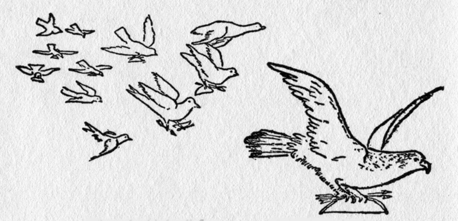
Then the birds all flew away to fight the animals
"The fox is to be the war-chief of the animals and his tail is to be their signal. As long as the fox holds his tail up, the animals are to go ahead and fight; but as soon as the fox drops his tail down, the animals are to run away."
The eagle was war-chief of the birds, so he sent a messenger to bring in the bee to their council.
"Mrs. Bee," said the eagle, "please sting the fox's tail for us so that we may win this war."

Mrs. Bee lit on his tail and began to sting it
Then the birds all flew away to meet and fight the animals. The little bee went and found the fox. The fox was leading the animals with his tail held up high. Mrs. Bee lit on his tail and began to sting it.
She kept stinging and stinging until the fox could stand it no longer. He dropped his tail down and ran away with all of the animals following him. And the birds won the war.
THE FOX AND THE LIZARD
Down near the Indian village of Laguna, there is a big sandstone rock over-hanging the roadside. Once upon a time a little lizard lived on the sunny side of this big rock. She was a happy little lizard and sang songs all day long.
One day a fox was going along the road and he heard the lizard singing:
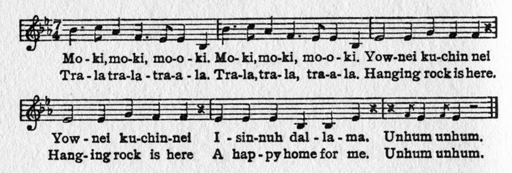
Now everything nice or pretty that anybody else has, the fox immediately wants, so he wanted the lizard's song. "I must get the lizard to teach me that song," so up on the rock he jumped to find the little lizard.
"Good morning, my friend," said the fox, "this is a beautiful day, and your song sounded so fine that I wish you would teach it to me."
"With pleasure," replied the obliging lizard and she sang the song over and over until the fox said he knew it.
"Thank you my friend," said he, "and now good-day, for I must be off to hunt my dinner," and away he trotted down the road singing as he went, "Mo-ki, mo-ki, mo-ki — ."

"Good morning my friend," said the fox
He came to a small pond where a flock of wild ducks were feeding on the grass seeds. He did not see the ducks, but they saw him and they flew up suddenly out of the water flapping their wings and quacking. The noise frightened the fox so much that he forgot his song. Try as hard as he might, he could remember only the first part.
He went running back to the lizard's house on the big rock. "My friend, I have forgotten the song you taught me; won't you please sing it again for me?"
The little lizard sang it again and once more the fox trotted down the road singing:
"Mo-ki mo-ki mo-o-ki,
Mo-ki mo-ki mo-o-ki,
Hanging rock is here. Hanging rock is here. A happy home for me.
Unhum unhum."
But he had not gone very far before a rabbit suddenly jumped across his path from behind a bush. The rabbit startled him so that again he forgot the song he was singing.
So a third time the fox went to find the lizard. This time he found her asleep in the warm sunshine. "I am sorry to disturb you, Miss Lizard, but I have forgotten my song again and I want you to teach it to me once more."
But the sleepy little lizard did not answer.
"I will ask you four times to sing," growled the fox, "and if you do not sing, I will eat you up."
The little lizard kept her eyes closed and paid no attention to him. The fox asked her four times to sing, and then he opened his big mouth and swallowed her down.
The warm sun on the rock made the fox sleepy too, so he lay down and went to sleep. While he was sleeping, the little lizard took a knife out of a pocket in her skin, with which she removes her old skin for a new skin dress each year, and she cut and cut the fox's side until she cut a hole big enough to slip out through. Then she took a sharp rock and put it inside the fox where she had been. After that she took a piece of sinew thread from her pocket and sewed the fox's side together again. Then she ran quietly home.
All this time the fox was fast asleep. When he awoke he felt thirsty, so he trotted back to the little pond for a drink. The stone in his side cut and felt very uncomfortable; and when he leaned down to drink, it overbalanced him and he fell, splash, down into the deep water and drowned.

He fell into the deep water and drowned
THE ROBIN AND THE BEAR
(Taos Pueblo.)
One winter, a long time ago, an Indian village called Taos was all covered with deep, deep snow. The Indians could not find any flint stones to make a fire with. They shut themselves up in their houses and were almost freezing to death; when one day a little brown robin with a brown breast came flying over the village. He was so cold that he fell in the plaza. The plaza is a big square place in the center of the village, where there are not any houses nor any trees.
A bear came along. "Pretty soon the Indians will all die from the cold and I'll be ruler of all this country," said the bear.
"Not if I can help it," replied the robin. "I will save the Indians even if it takes my life."
So the little robin flew away to the south. He found another Indian village where they had a big fire burning in the plaza. The robin picked up a piece of burning stick and flew back to Taos with it. He guarded the little flame from the wind by stretching his wing over it. When he reached Taos, he scratched a hole in the snow with his feet, and put the burning stick into the hole. Then he flew away and brought some twigs to put on it. Very soon the twigs began to burn and Robin flew away for more. While he was gone the bear came and blew his breath on the fire. He wanted to put it out so the Indians would freeze. And the fire did go out all but a few little sparks.
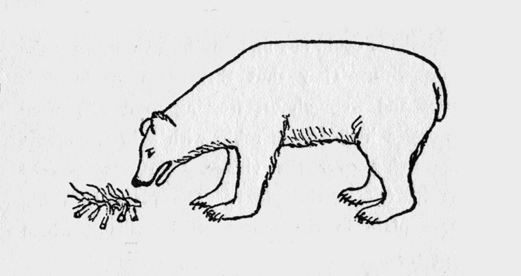
The bear came and blew his breath on the fire
When Robin came with the twigs he had to fan the sparks with his wings to make the fire burn again. "Burn, fire, burn for the freezing Indians!"
The fire burned and Robin flew away for more twigs.
As soon as Robin left, the bear came and blew his breath twice on the fire. The fire almost went out again, and when Robin came back, he had to fan and fan and fan it with his wing to make the little twigs catch fire and burn.

But Robin kept fanning the flame with his wing
The third time Robin flew away for more twigs, the bear came and blew his breath three times on the fire. This time the fire all went out except just one very tiny little spark; and the bear said, "Now I'll be ruler of this country."
But when the robin came back with his twigs, he fanned and fanned that little spark with his wings. For a long time the little spark would not blaze. But Robin kept fanning and begging, "Please, fire, burn for the Indians." All the time he was fanning, the fire was burning his breast; but he kept on fanning until the fire did burn, and burned too big for the bear to blow out.
The Indians saw a red light through their peephole windows. They looked out and saw the fire with Robin still fanning it with his wing. Then the freezing Indians all ran out; each took a piece of burning wood into his house and made a nice warm fire inside.
Nobody thought of Robin — poor little tired Robin — except an old, old woman, who was tired, too. She picked up the tired little bird and carried him into her house. She put him by her fire to warm him; but it was too late. Tired little Robin was dead. The old woman picked him up and found that his breast had burned red. And since that time all the robins' breasts are red.
WHITE CORN AND HER SONS FIRE
(San Juan Pueblo)
O-way-way-ham-by-hoh, old man Shrivelled Corn had a beautiful daughter named White Corn. White Corn was a widow with two sons both named Fire. They all lived together at San Juan.
Now Faint Star lived up in the sky, and was in love with the beautiful White Corn. Every night Faint Star came to beg White Corn to go up and live with him and be Mrs. Faint Star.
The Sun was in love with White Corn too, so every day he came to her house to beg her to be Mrs. Sun.
But White Corn loved her old father and her little sons Fire, so she would not go with either of them.
Faint Star grew tired of begging, so one night he slipped down to old man Shrivelled Corn's house and stole White Corn away. He took her away up to his house in the sky.
When the Sun came next day, he found that White Corn had been taken away. "In four days I'll meet that star," said the Sun, "and take White Corn away to live with me."
 Sure enough in four days the Sun took his peace pipe with some strong tobacco and went to Faint Star's house. Faint Star said good-morning to the Sun and invited him to sit down and tell what the Sun had come to see him about. They sat down and the Sun took out his peace pipe and filled it with the strong tobacco. He was accustomed to that strong tobacco, so when he took a puff on the peace pipe, it did not hurt him at all. He passed the pipe to Faint Star for him to have his turn at a smoke. But when Faint Star drew a puff of the strong tobacco smoke he fell over dead. Then the Sun caught up White Corn in his arms and carried her away to his house.
Sure enough in four days the Sun took his peace pipe with some strong tobacco and went to Faint Star's house. Faint Star said good-morning to the Sun and invited him to sit down and tell what the Sun had come to see him about. They sat down and the Sun took out his peace pipe and filled it with the strong tobacco. He was accustomed to that strong tobacco, so when he took a puff on the peace pipe, it did not hurt him at all. He passed the pipe to Faint Star for him to have his turn at a smoke. But when Faint Star drew a puff of the strong tobacco smoke he fell over dead. Then the Sun caught up White Corn in his arms and carried her away to his house.

The two little Fire boys grew to be big boys and all the time they were wondering how they could ever get their beautiful mother back again. They knew that the Sun had stolen her to live in his house; but they did not know how they could reach the Sun's house to get her away. Now that they were big the Fire boys decided to try to get to their mother anyway. So they went East and climbed over the highest mountain they could find, looking for a path to the Sun. While they were on top of the high mountain they saw a tiny line of smoke coming from the valley below them. They ran down to see from whence that smoke came. What do you think they found? Why, old Grandmother Spider cooking her dinner of corn meal mush. Her fire was made of tiny straws and her pot was no bigger than your thimble; but she invited the Fire boys to sit down and share her dinner with her. The Fire boys laughed:

Grandmother Spider cooking her dinner
"All of your dinner, Grandmother Spider, would not even be a taste for one of us!"
"Never mind," replied Grandmother Spider, "you are tired and hungry from your long journey and I bid you eat."
Just for fun the Fire boys dipped their fingers into the mush to taste it. It was delicious and as fast as they ate it, more mush came into the little pot. They ate and ate until they had a plenty; and when they finished, the little thimble-pot was still full of mush.
"Now," said Grandmother Spider, "you are ready to continue your journey and I will help you get your mother White Corn back from the Sun."
She took from her pocket a long peace pipe, a buckskin bag of tobacco and a little bag of medicine.
"Take these with you, Fire boys, and when you reach the Sun's house, fill the pipe with tobacco and smoke it. But when you pass the pipe to the Sun for his turn to smoke, drop this medicine into the pipe quickly. Now shut your eyes tight and do not open them until you hear the Sun speak to you."
The boys took the pipe, the tobacco and the medicine and then shut their eyes as Grandmother Spider had told them. Then Grandmother Spider spun a web all the way up to the Sun's house. She took the Fire boys up on the web and set them down at the Sun's door.

She took the Fire boys up on the web
"Good-morning, Strangers," said the Sun, "what do you wish at my house?"
The Fire boys opened their eyes.
"Let us smoke together," replied the Fire boys, "while we tell you our errand."
So they all sat down to smoke. The Fire boys took out the pipe that Grandmother Spider had given them and filled it with tobacco. Then each of them drew a long puff from the pipe; but when they passed it to the Sun, they dropped in the medicine, just as Grandmother Spider had told them to do. The Sun drew a puff from the pipe and immediately he fell back fast asleep. All the earth and everywhere grew dark. The Fire boys grabbed White Corn from the Sun's house and ran outside. Grandmother Spider was there waiting.
"Shut your eyes quick, boys."
The Fire boys shut their eyes and when they opened them again they were safely back in old man Shrivelled Corn's house with their beautiful mother White Corn and the Sun was shining outside once more.
THE PINE-GUM BABY
(Taos Pueblo)
A long time ago a beautiful river, that ran through the Indian village of Taos, went dry; for no rain had fallen for months and months and months. There was no water anywhere to drink, except in one little spring; and that little spring belonged to a coyote.
One morning a rabbit passed by the coyote's spring. "Good-morning, Rabbit-man," said the coyote, "how are you getting along this dry weather? You must get very thirsty."
"Oh no," replied the rabbit, "I get along fine. I have plenty of water, for I drink the dew from the cabbage leaves."
"But suppose the drought takes all the dew from the cabbage leaves, then what will you do?"
"I will find water somewhere else," replied the rabbit; and he hopped away.
Still there was no rain and everything was as dry as could be, except the coyote's spring. The rabbit grew very thirsty; so four days later when the coyote was away from home, the rabbit went to the coyote's spring and drank and drank the water. Later in the day the coyote met him: "Good day, Rabbit-man, how are you enjoying the dew from the cabbage leaves these days? Are you finding very much?" And the coyote threw back his head and laughed.
"Oh, I am finding enough!", and again the rabbit hopped away.
The next day the rabbit waited until the coyote went out to hunt for his dinner, then he went to the spring and drank and drank.
When the coyote came back home, he went to his spring for a drink. There was very little water left in it. "Who has been taking my water?", he growled. And then he saw rabbit tracks around the spring.
"So Rabbit-man has been stealing my water! That is why he is getting along so well this dry weather. I shall have to put an end to him."
So the coyote went out and found a piece of wood and cut out of it a baby animal. Then he got gum from the piñon trees and smeared it all over the baby. He put the gum baby beside the spring and hid himself in the bushes.
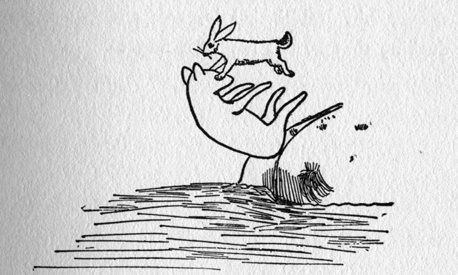
He grabbed the gum baby and pushed him into the water
Very soon the rabbit came along for a drink at the coyote's spring. When he saw the gum baby, he bowed and said, "Hello, what are you doing here?" But the gum baby just sat still and said nothing. This made Mr. Rabbit angry.
"I say 'hello', and if you don't speak to me politely I'll push you into the spring."
The gum baby did not say anything. Mr. Rabbit grew so angry that he grabbed the gum baby and pushed him into the water.
But the gum on the baby made the rabbit stick hard and fast to him; and when he fell into the spring, Mr. Rabbit fell in, too, and got a good ducking that he did not soon forget.
THE FOX AND THE INDIANS
(San Juan Pueblo)
O-way-way-ham-by-yoh, a fox, was living near an Indian village when the chief of the Indians died.
"Now I shall be chief of those people," said the fox; so he went to the village and called a council of all the Indians. A council means a meeting of people in a house; and the Indians' meeting house is the kiva. So when all the Indians came into the kiva, the fox said to them, "I am going to be your new chief." The Indians talked it over and said all right. But when the fox left the council, the Indians changed their minds and decided that they did not want the fox to be their chief.
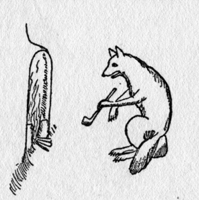
"I am going to be your new chief"
They sent a messenger to the fox and told him that he could not be their chief, for they had changed their minds about it.
The fox was sorry to hear the message, but he was determined to be chief of the Indians.
So the fox went out and gathered sunflower stalks. He took them to his den and began making flutes out of them. He blew on each flute that he made; and he kept throwing them away and throwing them away, because he did not like the tone of them. At last he made one that he liked, for it had a beautiful soft tone. He put it carefully away in his den. Then he went to the Indian village and told the Indians, "If I am not made your chief in four days, the water from the lake will come up and drown you."

It was the fox playing
The Indians did not believe what the fox said. They held another council in the kiva, and again sent word to the fox that he could not be their chief.
The fox then set to work and dug a tunnel — a long hole under the ground — almost to the edge of the lake. He took his flute — the sweet-toned one he had made from the sunflower stalk — and went into the tunnel. There was just a little bit of ground between him and the water in the lake.
Early the next morning an Indian went to the lake to get a jar of water. He heard a flute song coming out of the lake. It was the fox playing, but the Indian thought it was the water-god playing this tune:

The Indian ran back to the village and told the other Indians what he had heard; but they did not believe him.
The next morning another Indian went to the lake for water. He heard the fox playing on his flute in the tunnel. Again it sounded as if the water-god were playing in the lake. This Indian went back and told all the Indians what he had heard; but still they did not believe it was true.
But on the third morning, the two Indians who had heard the music by the lake asked many of the Indians to go down to the lake with them to listen for the water-god's music. The Indians went down and they heard the fox playing again. They all believed it was the water-god; so when they got back to the village, they called a council. They told all of the Indians:
"We have heard the music of the water-god. The fox told us that if he were not made our chief in four days, the water would come up out of the lake and drown us. The water-god is playing his flute. What the fox said must be true. The fox must be made our chief before tomorrow."
All the Indians agreed. They sent a messenger to the fox and told him to come and be chief. But the fox pretended he did not want to come. He wanted all of the Indians to come together to his den to invite him to be their chief.
That night the fox broke the ground away at the end of the tunnel, right next to the lake, so that the water could run into the tunnel.
When the Indians awoke the next morning, they heard the water rushing under the ground near them. They thought the water from the lake was coming to drown them; for it was the fourth day and the fox had not been made their chief. They all ran down to the fox's den just as fast as they could. They begged him, "Oh, please, Mr. Fox, come and be our chief, so that we may not be drowned!"
"If you are quite sure that you want me for your chief, I'll come," replied the fox.
"Oh, we are quite sure, quite sure, Mr. Fox!"
That was just what the fox wanted; so he went to the village with the Indians and they made him their chief and he ruled long and well and wisely.
THE COYOTE AND THE BLACKBIRDS
(San Ildefonso Pueblo)
A party of red-winged blackbirds were frolicking on the ice one winter day. They were laughing, skating and singing and having the gayest time.
"Upon the ice we jump and skate.
It crackles under all our weight.
Our red shoulders shine and glow.
And now together away we go.
Ong-yes-suhru."

And across the ice they skated together when they sang ong-yes-suhru.
Mr. Coyote heard their singing, so he trotted over to the ice.

Mr Coyote dashed out on the ice beside the blackbirds
"Let me skate with you, Blackbirds," he said.
"Oh, no one can skate with us who hasn't red shoulders," they answered. "You will have to get a sharp stone and cut your shoulders so that the blood will make them red, before you can skate with us."
So Mr. Coyote took a sharp stone and gashed both of his shoulders until the blood ran out and stained them red.
"Now I have pretty red shoulders, too. Now I can skate with you."

The blackbirds flew away
"Oh no, not unless you can sing our song," they said.
Mr. Coyote tried to sing in his big deep voice; and dashed out on the ice beside the blackbirds.
The blackbirds flew away. They knew that Mr. Coyote only wanted to catch them to eat them up. And Mr. Coyote was so angry when they flew away, that he ran along the ice clawing at the blackbirds' shadows, until his feet were torn and bleeding and he had to give up the chase.
PAY-TAY AND THE WIND-WITCH
(San Juan Pueblo)
Pah-tay was a little Indian boy who lived long, long, long ago. One night when he was going to bed on his pile of pretty red and yellow blankets, he said to his mother:
"Ye-ah, it is going to snow tomorrow. I will go hunting and kill you some rabbits. Please put my quiver of arrows, my new bow that Tay-tay made me, and some lunch by the door before you go to bed; for I shall leave early in the morning."
Just like all other mothers, Pah-tay's mother did as he asked her. She put his new bow and arrows against the door-post. She wrapped up some hard baked bread in some corn husks for his lunch. She put this lunch beside the bow and arrows; and right on top of it she placed a little bag made of buckskin filled with corn meal. Ye-ah wanted Pah-tay to sprinkle a little sacred meal over all the water he passed, so that the Rain-God would give him luck and bring him safely home again.
Next morning when Ye-ah awoke, the little bed on the floor next to her blanket-bed was empty. She looked over by the door and the things she had placed there were gone. She got up quickly and looked out of the little peep-hole window; it was snowing and the big round red sun was hidden. Pah-tay had already gone out over the prairie to hunt rabbits. Quickly Ye-ah went into the little room where outsiders were never allowed to go, and took some sacred corn meal out of a jar. She dropped the meal into the center of a round pile of sacred rocks; so that the good spirits would take care of her little boy out in the snow.
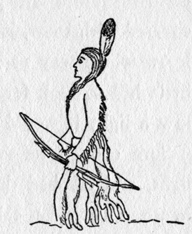
Pah-tay wandered about killing rabbits
For many hours Pah-tay wandered about in the snow storm killing rabbits. He killed so many that they were hanging thick all around his belt. It had been growing dark and the snow had gotten so deep that it was difficult to walk through it; but little Pah-tay had been so interested in his rabbits, that he did not notice either the darkness or the snow until he had used his last arrow.
Then he was ready to go home; but when he turned around all parts of the country, being covered with snow, looked just alike and he did not know which way to go. He went up on top of a little hill to look for a light. He knew that if he saw a light it would come from a house.
Sure enough he saw a light. He went to the light, and climbed the ladder he found beside the house. Then he called down through the open door, "Does a friend live here?"
"Yes, a friend lives here, come down!"
Pah-tay climbed down the inside ladder to the floor, and an old woman roughly caught his arm.
"I am glad you have come for I eat little children," she said, "and I am starving for raw meat."
Poor Pah-tay began to tremble. He tried to pull his arm away from the old witch, for that is what the old woman was, but she held him tight.
"Aha, what is this you have here! Rabbits!" and the old witch began to smack her lips.
"I shall eat these rabbits first and then I will eat you."
She pushed Pah-tay down into the corner and began to skin the rabbits. She ate the rabbits one by one with her sharp teeth. Pah-tay tried to slip by her to run away; but she pushed him back with her bloody hands. He watched her eat all of the big pile of rabbits but two, and he shivered to think how soon she would eat him.
"It is warm down here. I would like to go up and sit on the roof," he said.
"No," replied the witch, "I will not give you a chance to get away."
"But if I am too warm, I will not taste good."
"That is true; but you will taste better than no boy at all."
There was only one more rabbit!
"You tie all of your belts together," suggested Pah-tay," to make a strong rope, and then tie one end to my leg and hold the other end while I go up on the roof."
 The old witch agreed, so she made a rope of all of her belts. She tied one end to Pah-tay's leg and he climbed up the ladder. As soon as he was up, he untied the rope from his leg and tied it to the ladder. Then he whispered: "Little fairy in the ladder, whenever the old witch calls me, please answer 'here I am'". And then he climbed quickly and quietly down the outside ladder and ran up on the hill to look for another light. He saw one and ran to it.
The old witch agreed, so she made a rope of all of her belts. She tied one end to Pah-tay's leg and he climbed up the ladder. As soon as he was up, he untied the rope from his leg and tied it to the ladder. Then he whispered: "Little fairy in the ladder, whenever the old witch calls me, please answer 'here I am'". And then he climbed quickly and quietly down the outside ladder and ran up on the hill to look for another light. He saw one and ran to it.
In the doorway of the house, Pah-tay found two men singing and beating a drum.
"Please, let me in. An old witch is trying to eat me up and I want to hide."
The men let him in, and inside some women were grinding corn on big stones. Pah-tay hid behind one of the stones.
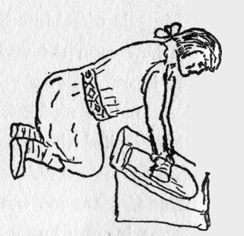
The women were grinding corn
All the while the witch was eating the last rabbit, she kept jerking the rope and calling, "Are you there, little boy?" And each time the little fairy in the ladder answered, "Here I am."
But the last time she jerked, the rope came untied. The witch looked up and did not see Pah-tay. "He has run away, but I'll catch him," and she showed her sharp teeth.
She turned around and around and changed herself into the north wind. Then she went whistling after Pah-tay. She followed him to the house where the men were singing. There she changed herself back from the wind to an old woman.

She changed herself into the north wind
"Where is that little boy who came here a few minutes ago? I want him," she wheezed.
"Go in," replied the men, "and if you find him, he is yours."
The old witch went in and looked in all of the dark corners. When Pah-tay saw her coming towards the stone where he was hiding, he ran outside again. He saw another light and ran to it. This light was in a kiva and the medicine men were dancing inside with their rattles. Down into the kiva climbed Pah-tay. He jumped into a hole in the big rattle of one of the medicine men. He bumped around in the rattle with a funny noise; but the medicine men kept on singing and dancing.
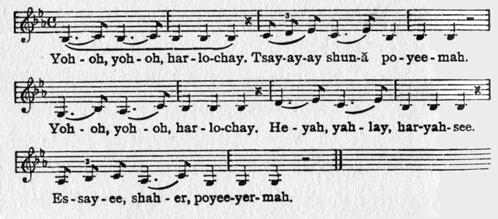
As soon as the old witch found that Pah-tay had left the house where the women were grinding meal, she whirled around and changed herself again into the north wind and followed him. She went down into the kiva to get him; for she had changed into an old woman again. But the sound of the rat-

The medicine men were dancing with their rattles
tles confused her. She tried to climb the ladder to get out again, but before she reached the top the rhythm made her fall back dead.
And Pah-tay went back home to Ye-ah.
MR. COYOTE AND THE TWO PRETTY GIRLS
(Santa Clara Pueblo)
Mr. Coyote was walking along the river's edge one morning, when he saw two pretty young girls filling their water jars from the river. He ran up into the mountains, collected all kinds of fruit that grew there, and hurried back to the river with it. He hid in the bushes and dropped the fruit down into the water near the two girls.

He hid in the bushes and dropped the fruit down into the water
The girls were greatly surprised when they saw the fruit. Where had it come from, they wondered. They looked all around and could see no one, so they dipped up the fruit with their gourds and had a big feast.
When they went home with their water jars the girls told their parents; "Oh, Tah and Ye-ah, we found the most delicious fruit in the river this morning. It was floating all around in the water. But we ate it all up."
Their father and mother said, "Tomorrow you must bring some fruit home to us."
The next morning when the girls went to the river with their water jars, there was not any fruit in the water. "What shall we do? Tah and Ye-ah will think we have been deceiving them and will punish us. What shall we do?"
Mr. Coyote, who had been awaiting them in the bushes, just laughed. Then he trotted up into the mountains again and brought more fruit and dropped it quietly into the water. Then he laughed to see how eagerly the girls dipped it up with their gourds.
The girls took the fruit home to their parents. It tasted so delicious that the father said, "Tomorrow your mother and I will go for water so that we can get the fruit."
So the next day the father and mother went down to the river with their water jars. They looked and looked, but there was no fruit in the water. Mr. Coyote, who had been waiting to see the pretty girls, saw them searching for fruit. He rolled over and over with laughter and then he ran away still chuckling.
DEH-A
O-way-way-ham-by-yoh, in the land of the Taos Indians, all of the tribe went out in the forest to gather nuts. While they were there a young girl with a cruel heart found a little baby boy. She did not tell anybody about the baby boy; and she had no way to carry him home with her, so when they returned to the village she left the little fellow in the mountains.
Ten years later a party of Taos Indians went up into those same mountains with long bows and arrows to hunt deer. While they were slipping around quietly behind the trees, they saw an old coyote with some little coyotes; and standing beside them was a little naked boy ten years old. The Indians did not dare to shoot at the coyotes for fear they might kill the little boy, so they jumped out from behind the trees and tried to catch the boy. But he was too quick for them. He could run faster than the coyotes, and they all ran into the coyote's den in the side of the mountain.
The mother coyote had found that little baby and taken him to her den. She had fed him and kept him all those years.
The Indians went back home and called a council of all of the tribe. They told them about the little boy they had seen in the mountains.
"He belongs to our tribe, we must go up into the mountains and get him," said the old chief.

He could run faster than the coyotes
So the warriors went up into the mountains. One warrior went to the mouth of the coyote's den. The other warriors made a big circle around the place where the little boy and the coyotes were, in order to try to catch him. The little boy was so quick, he ran right through the circle and ran as fast as he could toward his den-house; but the man there caught the boy in his arms and held him tight.
It was so late that the Indians had to camp in the woods that night. They made a big fire and roasted some deer meat for their supper. The little boy would not eat any cooked meat. The Indians had to feed him with raw meat just like the coyotes had fed him.
When they got back home the Indians named the little boy Deh-a, which means "fox"; because he came from the woods. They put Deh-a down into the cellar of a house for a year to tame him, and all the Indians prayed that the Great Spirit would give him magic.
Deh-a had learned all the animal languages while he lived with the coyotes. He knew all the signs of the weather — when it would rain and when it would snow. When he heard the coyotes howl, Deh-a knew there was danger from other animals; and so he became a very wise little boy.
One day Deh-a looked at the clouds growing dark all around the village. He told the Indians it was going to rain for forty days and forty nights. He begged them to pack up all the food they would need for forty days and to climb to the top of the highest mountain, so that the rain might not drown them.
Half of the Indians did not believe him and stayed at home. The other half took food and climbed up the highest mountain they could find. When they reached the top of the mountain, the rain began to fall and all kinds of animals climbed the mountain too, until the top of the mountain was all covered with Indians and animals. The turkeys were the last ones to get there. It rained so hard and so fast that water covered all of the low places. It drowned all of the people who stayed at home and washed away their houses. The water covered all of the trees, all of the hills and all of the mountains, except the one where the Indians had gone with Deh-a. It ran around the mountain top so fast that it became covered with white foam, little bubbles, you know — and the foam touched the tails of the animals that were on the lowest ring around the mountain and those animals have white tips on their tails to this very day.
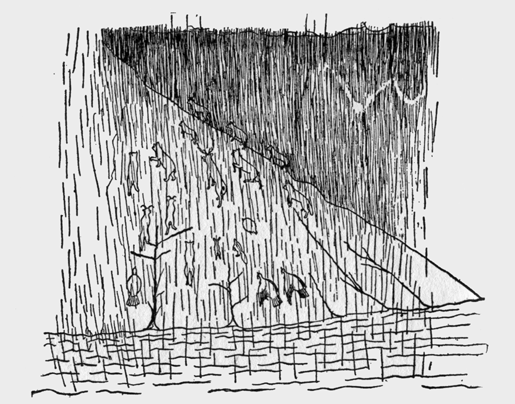
All kinds of animals climbed the mountain
THE CONCEITED ANT
(Seama, a Laguna Pueblo)
One winter morning when the ground was covered with snow, an ant came up out of his house.
"Snow," he said, "I am the strongest thing in the world. I am stronger than you!"
The snow made no answer, but he silently froze the little ant's feet.
"Oh, Snow, you are stronger than I, for you have frozen my feet and I have not even made an impression upon you. Are you the strongest thing in the world?"
"No," replied the snow, "the sun is stronger than I am; for he can shine down upon me and melt me."
Then the ant asked the sun: "Are you the strongest thing in the world, Sun?"
"Oh no, the clouds are stronger than I. When I am shining they come between me and the earth and hide my face."
"Well, you, Cloud, are you the strongest thing in the world?"
"The wind is stronger than we are. It blows and drives us around wherever it pleases."
So the ant asked the wind: "Are you then the strongest thing in the world, Wind?"
"No, a house is stronger than I am; for when I am blowing, it turns me aside and sends me on in another direction. A house is stronger than I."

"When he catches me he will eat me up"
"Then, House, you must be the strongest thing in the world?"
"You are mistaken, Ant, a mouse is stronger than I am, for he cuts holes in my walls."
The ant found a mouse: "Are you, too, stronger than I am? Are you the strongest thing in the world, Mouse?"
"Indeed no, the cat is stronger than I am. When he catches me he will eat me up."
The ant went to ask the cat, "Cat, are you the strongest thing in the world? The mouse says you are stronger than he."
"I may be stronger than the mouse; but the poker is stronger than I am; for it gives me hard licks sometimes."
Then the poker must be the strongest thing in the world, thought the ant; so he went and asked the poker.
"No, I am not the strongest thing in the world," replied the poker, "for the fire heats me and could melt me. The fire is stronger than I."
"Well, Fire," asked the ant, "are you the strongest thing in the world?"
"Water is stronger than I. It can put me out. Go ask Water."
So the ant asked the water.
"No, I am not the strongest thing in the world," answered Water, "Ox can drink me."
"Well, what about you, Ox?" asked the ant.
"Man drives me. He is stronger than I am."
"Then Man, you must be the strongest thing in the world. Even stronger than I am," said the ant.
"No," replied Man, "knife can cut me. He is stronger than I."
 Finally, the ant went to the knife: "Knife," he asked, "are you stronger than I am? Are you the strongest thing in the world?"
Finally, the ant went to the knife: "Knife," he asked, "are you stronger than I am? Are you the strongest thing in the world?"
"No, I am not the strongest thing in the world; but I am stronger than you are;" and with that, the knife fell upon the ant and cut him into pieces.
THE FOX AND THE SKUNK
(Santo Domingo Pueblo)
One day, once upon a time, Mr. Fox slipped into a watermelon patch and stole a melon. He saw Mr. Skunk coming, so he ran and climbed a tree to hide and eat his melon. But Mr. Skunk walked right under the tree and spoiled Mr. Fox's melon.
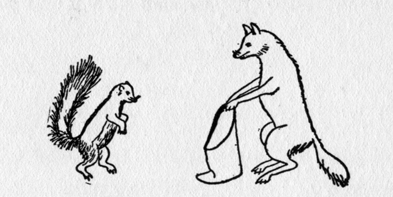
The fox made a bag for the skunk
"I shall get even with Mr. Skunk for spoiling my watermelon," said he; and down he jumped from the tree. He was so angry that he ran up to Mr. Skunk to have a battle with him. Very soon he found that he could not whip Mr. Skunk, so he decided to make friends with him.
They walked along together for a short distance and then Mr. Fox looked up and said: "It is going to rain. Let me make a bag to put you into, Skunk-Man, to keep you dry. I can find a hole somewhere for myself." And the fox made a bag for the skunk. All the time he was making it, Mr. Skunk was jumping around singing and dancing with joy. When it was finished, Mr. Skunk crawled in and Mr. Fox tied him in and fastened him up to the limb of a tree.
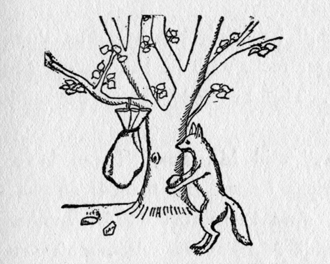
He threw big rocks that hurt Mr. Skunk
Then the fox picked up a handful of pebbles and threw them over the bag, to make the skunk think that it was raining. He took another handful of pebbles; then a handful of larger rocks; and then still larger rocks, until he threw big rocks that hurt Mr. Skunk.
"Ouch," he cried; but Mr. Fox threw bigger and bigger rocks until he had bruised Mr. Skunk all over. Then he left him to get out the best way he could.
"Now," said Mr. Fox, "I can have all the watermelons I want and there is no one to spoil them." And he trotted off for another melon.
But while Mr. Fox was selecting his watermelon, an Indian boy, who owned the patch, came along and pierced him with his arrow. And to this very day Mr. Fox carries the scar from that arrow in his right front shoulder.
TEN LITTLE PRAIRIE DOGS
(Seama, a Laguna Pueblo)
Ten little prairie dogs, one day, long time ago, started up out of their hole with their drum. Their mother said: "Do not dance outside, my children, for if you do an eagle will swoop down upon you and eat you all up."
But the ten little prairie dogs only laughed and went on outside to dance. They sang as they danced:
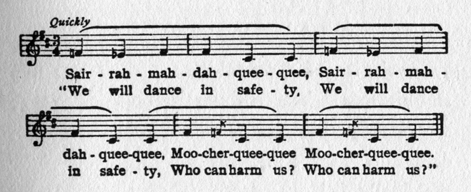
Sure enough while they were dancing around the hole, an eagle came down and swallowed them all. The last one she ate was the prairie dog with the drum and she swallowed him drum and all.
Then the eagle went to get a drink of water. When she leaned down to drink, she felt very queer and she could hear a drum beating. It was the ten little prairie dogs dancing inside her. They danced so hard and made the eagle so sick that she finally fell over dead. Then all of the little prairie dogs came out again and ran home to tell their mother all about it.

An eagle came down and swallowed them all
The next day the ten little prairie dogs started outside again to dance. "Do not go out, my children," said their mother, "the Indians have set a trap for you. They will catch you and eat you if you go outside."
But the little prairie dogs only laughed and went outside again.

"Let us see what a trap is like"
"Let us go and see what a trap is like," suggested one little prairie dog, so they all started over the prairie in search of a trap. They found one and all got caught in it. This time they never got back home to tell their mother all about it; for the Indians roasted and ate them.
THE BEE AND THE FOX
(Seama, a Laguna Pueblo)
A bee was sitting on a flower singing happily one day:
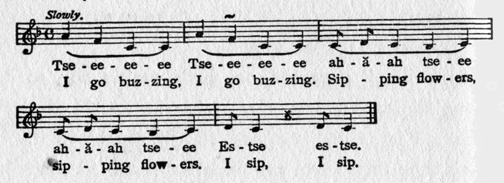
when a fox passed by.
"Why are you singing so happily, Mrs. Bee?" asked the fox.
"Because I am making honey," answered she, "and honey is sweet enough to make anybody happy. Would you like to taste my honey, Mr. Fox?"
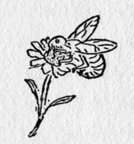
Sitting on a flower singing
Then Mrs. Bee put her foot on Mr. Fox's tongue and gave him a taste of her honey.
"That is the best thing I have ever tasted. How do you make it, Mrs. Bee? I want to make some myself."
Mrs. Bee laughed and said, "I get it from my feet by pounding them with a stone. At first when I strike them, blood comes; but beneath the blood is honey, so I keep pounding them until the blood has all come out and then I get the honey."
Mrs. Bee laughed again and flew away buzzing.
Mr. Fox found a big stone. He sat down and began to pound his feet. It hurt him very much, but he wanted some honey; so he kept pounding and the blood kept coming. He pounded his hind feet entirely away and still there was no honey.
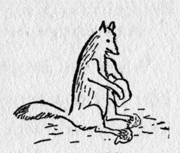
He sat down and began to pound his feet
He knew then that the bee had tricked him. He was so angry that he wanted to pound her into pieces with that same stone; but the little bee had wisely flown so far away that Mr. Fox could never find her.
THE FOX AND THE MICE
(Seama, a Laguna Pueblo)
A long, long time ago a fox went to sleep on a sunny slope. While he was asleep four little mice pulled all of his hair out. They sang as they worked, "The fox is dead. Hoo-ray, hoo-ray, hoo-ray!"

When he awoke and found his hair all gone, Mr. Fox was very angry. He saw the mice tracks and followed them to their hole. There he met the first little mouse.
"Who pulled all of my hair out?" angrily asked Mr. Fox.
"My brother did, not I," said the little mouse, and he ran away to the north.
Mr. Fox dug down into the mice's home until he found the second little mouse:
"Who pulled my hair out?"
"Not I, my brother did," replied the second little mouse and he ran away to the south.
Mr. Fox dug deeper until he came to the third little mouse:
"Tell me who pulled all my hair out?" thundered Mr. Fox; for he was growing madder all the time.
"I didn't pull it out," answered the third little mouse, "my brother did," and he ran away to the east.
And so Mr. Fox dug farther down to where the fourth little mouse was.
"Did you pull all my hair out?"
"No sir, not I. It was my brother," and that little mouse ran away to the west.
Mr. Fox kept on digging until finally he found all of his hair lying at the bottom of the mice's home. He wanted to kill the mice; but they had all run away. So Mr. Fox took his hair out. He gathered some gum from a piñon tree and spread it over a flat stone. Then he put his hair on the gum and lay down with his back on the stone, to try to rub his hair on again. He thought the gum would glue his hair onto him; but instead, it glued the stone hard and fast to his back. Everywhere he went he had to carry the heavy stone.
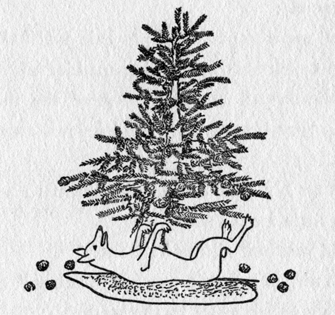
He lay down with his back on the stone
He looked so funny without any hair and with a stone on his back that when he met another fox, the other fox rolled over and over with laughter.
"You need not laugh, Brother Fox. Instead, you had better wish that you were in my place. I am carrying this stone to the beautiful daughter of the Indian chief at Zuni for a bread stone. She has promised to reward me for it."
"Oh please let me help you carry it," begged the other fox.
"I would not let you if I were not tired," replied the first fox, "but since I am tired, I think I will let you help me."
So the second fox took the stone off of the first fox's back and put it on his own back. And there it stuck hard and fast, while the first fox ran away laughing.
The second fox went along toward Zuni until he found a third fox.
"I am taking this stone to the Zuni chief's beautiful daughter in exchange for a reward. She wants it for a bread stone," said he to the third fox; "Would you not like to help me for I am growing weary?"
"Indeed I should," and the third fox took the stone and put it on his back. And there it stuck hard and fast. This time the second fox ran away laughing.
Then the third fox went on toward Zuni until he met a fourth fox.
"Good-day, Brother," said the third fox, "I am very tired. Can you tell me how far it is to Zuni; for I am carrying this stone to the Indian chief's beautiful daughter and she will give me a reward for it?"
"Oh, it is not far. Let me help you," said the fourth fox; for he wanted the reward, too.
So the fourth fox took the stone and it stuck hard and fast to his back. The third fox trotted away laughing.
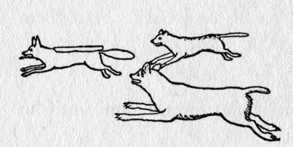
The dogs almost caught him
When the fourth fox reached Zuni, the dogs ran out and chased him. The stone was so heavy on his back that the dogs almost caught him. For many days he wore that stone around on his back until finally the gum wore away and the stone fell off.
DY-YOH-WI AND HIS EAGLE
(Seama, a Laguna Pueblo)
Once upon a time an Indian boy, Dy-yoh-wi, had an eagle. When Dy-yoh-wi went out to hunt rabbits and other small animals for food for his eagle, the people in the village were mean to the eagle. They treated it so unkindly that the eagle grew unhappy. One day he said to Dy-yoh-wi: "Go put on your war clothes and I will take you up to live among the eagles. It is pleasanter up there than here."
Di-yoh-wi did not like to leave his people; but the eagle insisted, so he did as he was bid. Then the eagle took him on his back and flew four times around the plaza. While they were flying around, Dy-yoh-wi cried and sang for he felt so sad:

The people heard him singing. They came out of their houses in time to see the eagle fly away to the cliffs with him. When his father and mother heard what had happened, they wept and moaned.
Dy-yoh-wi was not very happy, either, up among the eagles. His eagle did everything to make him happy. He took Dy-yoh-wi to visit in all the other eagles' houses. He flew down among the Navaho Indians and brought back clothes and skins for him; but still Dy-yoh-wi was homesick.
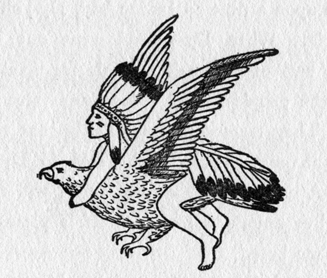
The eagle took him on his back
Two spiders saw that he was sad, so they took him down on their web one day to their home in the valley. While he was there he hunted deer to the north, the south, the east and the west. He ate and ate and then saved some of the meat for his eagle. The spiders spread the skins out in the sunshine and pulled all of the hairs out of them. Then they told Dy-yoh-wi that when he left the cliff he should stick a needle through the skins and see what he could make. That was the way they taught Dy-yoh-wi that he could make clothes and shoes out of buckskin; for the Indians had not known the use of buckskin before.

The spiders pulled all the hairs out
But Dy-yoh-wi was not happy with the spiders either, so the eagle came down and took him up again to his home on the cliffs.
"You cannot be happy here, Dy-yoh-wi," said the eagle to him one day," and I cannot be happy with your people, so now I will let you go home and you must let me stay here."
So Dy-yoh-wi took all the things that the eagle had gotten for him from the Navahos, and all of his deer skins and tied them in a bundle on his back. Then the eagle took him to the bottom of the cliff and he walked home.
His people saw him coming and ran to tell his father and mother. They all rushed out to meet him and there was great rejoicing over Dy-yoh-wi's return.
Dy-yoh-wi grew to be a great man. He taught his people how to make clothes and moccasins of buckskin and never again caught another eagle.
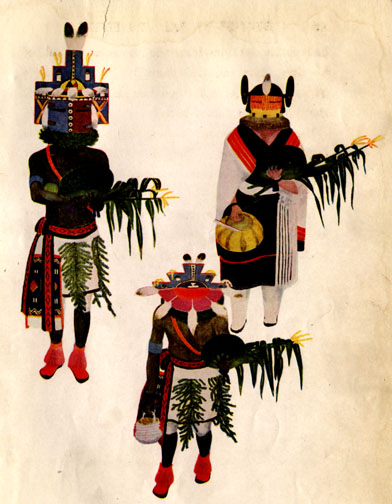
The Indians were having a big Kachina dance
THE THIEVING FOXES
(Seama, a Laguna Pueblo)
Once upon a time the Indians were having a big dance because they had gathered much corn and many squashes and other things to eat; for the Rain-God had been very kind and sent many showers to make things grow. They were singing and making music with the dried shoulder blades of sheep.

A fox on top of the high mesa beside the valley saw them dancing. He howled and howled in all directions. Blue foxes ran to him from the east; yellow foxes came from the west; gray foxes from the north; and black foxes from the south.
"Brothers," said the first fox to them, "the Indians have much corn and many good things to eat. They are busy singing and dancing and will not see us. Let us go down and help ourselves to the good things."
"How can we get down the cliff?" asked one fox.
"We will make a chain," replied the first fox, "by biting each others' tails; and then we can climb down the cliff. But not a fox must open his mouth or the chain will be broken and we shall all fall."

They made a long chain down the steep cliff
So the first fox started down the cliff; the second fox caught and held his tail tight between his teeth. The third fox caught the second fox's tail; the fourth fox held the third fox's tail; and so on until each fox held another fox's tail and they made a long chain down the steep cliff.
But an ant stung one of the foxes near the top and he forgot his orders, opened his mouth to snap the ant, and let the tail he held slip out from between his teeth. Down fell all of the foxes; down the steep cliff onto the rocks below, and every one of them was killed.
BUNNY RABBIT AND THE KING OF BEASTS
(Taos Pueblo)
Bunny Rabbit had been playing so many pranks on the other animals that the King of Beasts decided he would have to eat him up. So he told the Fox: "Go bring Bunny Rabbit to me, so I can eat him up and get him out of our way."
The Fox trotted off over the prairie and found Bunny Rabbit. "Come with me, Bunny Rabbit. The King of Beasts has sent for you."
"All right," replied Bunny Rabbit, "but before we go, don't you want some nice apples to eat? Right over there in that field there is a tree just full of apples. You go over and get some and I'll wait here for you."
Apples sounded very good to the Fox, so he left Bunny Rabbit and went to find the tree. Bunny Rabbit ran away. The Fox found the apples so delicious that he stayed under the tree all night eating them. Next morning he had such a pain in his stomach that he lay on the ground and rolled over and over, moaning and groaning.
When the Fox did not come back with the rabbit, the King of Beasts called the coyote: "Coyote, go find the Fox and see why he hasn't brought the rabbit to me."
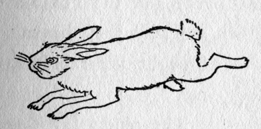
Bunny Rabbit ran away
So the Coyote set out to find the Fox. He found him groaning under the apple tree.
"Where is Bunny Rabbit? Why haven't you taken him to the King of Beasts?"
"I swallowed him," said the Fox, "to keep him from getting away and he is kicking around in my stomach so hard to get out that I have a dreadful pain. I cannot walk. Please go over on the other side of that hill and bring me some of the herbs growing there. They are good medicine and will make me feel better. Then we can take the rabbit to the King of Beasts."
Coyote ran over the hill to get the herbs. He bit off a mouth full of herbs to take to the Fox. They tasted so good that he kept eating and eating them. He stayed there all night eating the herbs.
Next day the King of Beasts called the piñon jay bird: "Go, find the Coyote and the Fox and see why they haven't brought the rabbit to me."
The piñon Jay flew away over the prairie. He found Bunny Rabbit. He did not wait to find the Coyote and the Fox. He just flew away with Bunny Rabbit to the King of Beasts.
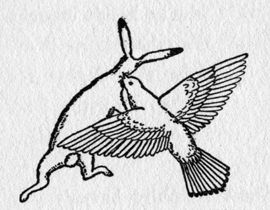
He flew away with Bunny Rabbit
The King of Beasts showed his sharp teeth and licked out his long tongue; "Well, Bunny Rabbit, I have you at last. You have been annoying the other animals so much with your pranks that I am going to eat you up!"
"I am very tired, King of Beasts, I shall be glad to be eaten up; but wouldn't you like some fat little prairie dogs to eat first? I know where there are lots of fat ones. I will show you."
Now Bunny Rabbit knew where a hunter had set a trap in the woods, so he led the King of Beasts right into the trap. The trap caught the King of Beasts' foot and held him tight for the hunter. Bunny Rabbit ran away calling, "I hope you will enjoy the prairie dogs, King of Beasts."
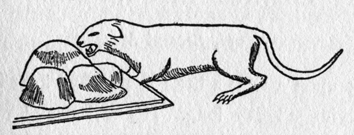
The trap caught the King of Beasts and held him tight
THE LITTLE INDIAN BOY WHO WAS CHANGED INTO AN OWL
(Hopi, Second Mesa)
Once upon a time a little Indian boy kept crying and crying all day long. His father and mother could not make him stop crying, so finally they put him outside and shut the door; for they could not stand his noise any longer.
He kept on squalling outside, so an owl came and took him away.
When the little boy's father went out to get his son — because he thought the boy had stopped crying — he could not find him anywhere. He looked all over the village and all over the mesa, but he could not find him. He was distressed and he and the little boy's mother wept and mourned.

Burros loaded with wood
Several days later the father took his burros to go for a load of wood. He passed near The Owls' Cave, where many owls live. As he passed by he heard his little boy's voice calling, "Father, Father, here I am." He looked into the cave, but he could see only a lot of owls up on the rocks inside. There was one owl bigger than all the rest and that owl said, "I am your little boy, Father."
"Well, come to me if you are," replied his father.
"No," said another owl — the same owl that had taken the little boy away — "He cannot go with you unless he promises not to cry so much and be such a bad boy."

The father took the little-boy-owl by his wing
"I will be good," said the little-boy-owl.
"Well then, you may fly down to your father. He must put you in the kiva and keep you there for four days; and if you have kept your promise to be good, then you will turn back into a little boy once more."
So the father took the little-boy-owl by his wing and carried him home. He put him into the kiva, as the old owl had told him, and kept him there for four days. And sure enough at the end of that time the owl was a little boy again.
And the little boy was good ever after.
THE FOX AND THE SHEEP
(Hopi, Second Mesa)
Once upon a time a fox and a sheep were neighbors. The sheep was so round and fat that the fox wanted to eat him up, but since that would not be a neighborly thing to do, he thought and thought of an excuse to eat the fat sheep. So one day the fox went to call on the sheep.
"Let us play games together, Sheep-Man," said Mr. Fox, "Let us play hiding. I will hide and if you cannot find me then I will eat you up."
Now since the fox was the sheep's guest, the sheep had to play with him. So the fox hid under a pile of blankets. The sheep looked about and soon found him.
"Now it is my turn to hide," said Mr. Sheep. He hid among the rocks; but the fox found him, too.
"Let us play rolling," suggested Mr. Fox. "We shall roll down the side of this wash and if I beat you then I will eat you."
So they tumbled down the slope; but the sheep was fatter and rounder than the fox so he reached the bottom first.

"Let us play rolling" suggested Mr. Fox
Mr. Fox was disappointed for he wanted very much to eat that nice fat sheep.
"Well, let us run a race," said Mr. Fox "and if I beat I shall eat you up." He was sure he could run faster than a fat sheep.
So they ran a race; but the fox stepped on a sharp stone and turned his ankle. He could not run fast with a sprained ankle, so he just limped along and the sheep won the race.
"Now let us play jumping," said Mr. Fox. "We will jump over this wash and whoever does not jump across to the other side will be eaten."
The fox jumped across easily; but the sheep only got three legs over. His fourth leg slipped into the wash.
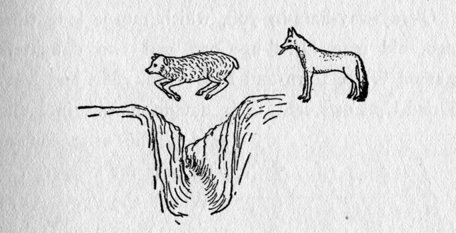
"Now let us play jumping," said Mr. Fox
"Good," laughed Mr. Fox, "now I can eat your leg." So the fox cut off one of the sheep's hind legs and roasted it.
After that the lame sheep was never at home when the fox came to call.
WHITE CORN AND THE GRASSHOPPERS
(San Juan Pueblo)
O-way-way-ham-by-yoh, which means long time ago, old man Dried-Up-Corn had two daughters named White Corn and Blue Corn. Mr. and Mrs. Dried-Up-Corn sent their daughters out into the garden one afternoon to pick peas for supper.
When the two Corn maidens went outside they found some grasshoppers dancing and singing all around the garden. But when the grasshoppers saw White Corn and Blue Corn they started to hop away.

The grasshoppers began to dance
"Oh do not go away, Grasshoppers. If you will dance and sing some more for us, we will give you a row of peas."
So the grasshoppers began to sing and dance again:
"We are bow-legged.
Our faces are as hard as can be;
But whatever else may be,
They are alike on both sides; you see.
Fee-de-qui quah, quah.
Fee-de-qui, quah, quah."

The Corn maidens laughed and clapped their hands. When the grasshoppers stopped singing and ate up their row of peas, White Corn begged: "Oh please dance and sing again and we will give you another row of peas."
So the grasshoppers kept dancing and singing until the girls had given them all the peas. Then the grasshoppers hopped away and White Corn and Blue Corn went back into the house without any peas for supper.
What do you think happened to White Corn and Blue Corn then? They were spanked and put to bed without any supper. Which was quite the proper thing, don't you think?
POH-VE AND PAH-DAY. (SISTER AND BROTHER)
(Pueblo Indian Story told by a Hopi, Second Mesa)
A long time ago in the land of the Pueblo Indians, an Indian girl and her brother lived with their father and step-mother in an Indian village beside a river. The brother and his father were away from home most of the time looking after their sheep and cattle; so the little girl, Poh-ve, was left alone with her step-mother, who was not very kind to her. She was not happy except when her brother, Pah-day, was at home. These two were devoted to each other, but since Pah-day was rarely ever at home, Poh-ve was very sad.
 One afternoon Poh-ve's step-mother sent her down to the river with a pretty
Indian jar to get water. "Get out of my sight," she said, "and when you
come back bring me some water!" Poh-ve found several other little girls down
at the river, so she set the jar down and played with them all afternoon.
Late that afternoon when she picked up her water jar to go home, it fell on
a stone and broke into pieces. Her step-mother was very angry when Poh-ve returned home so late and without the jar, so she punished her severely.
One afternoon Poh-ve's step-mother sent her down to the river with a pretty
Indian jar to get water. "Get out of my sight," she said, "and when you
come back bring me some water!" Poh-ve found several other little girls down
at the river, so she set the jar down and played with them all afternoon.
Late that afternoon when she picked up her water jar to go home, it fell on
a stone and broke into pieces. Her step-mother was very angry when Poh-ve returned home so late and without the jar, so she punished her severely.
"I did not mean to break the jar," thought Poh-ve, "and I shall run away and leave my unkind step-mother tomorrow."
So early the next morning Poh-ve went down to the river. She walked up and down along the river's edge until she found a place that she could wade across. Then she went across the river for the first time. She looked around that strange country until she found a path, which she followed. The path led on and on until she reached a lake. She did not know how to cross the lake; but she was determined not to go back to her mean step-mother. Just then a fox came along with a bow and arrow: "Good-day, little Miss, where are you going?" asked Mr. Fox.
"I do not know where I am going," replied Poh-ve. "My step-mother is very mean to me, so I am going away to live. I do not know where I am going, but I must go somewhere."
"Well, there is an Indian village on the other side of the lake. The Governor of that village is a good man. You will find him in his corn field on the west side of the village. Take this arrow and shoot it across the lake. Then go to this Governor and tell him your story, and he will take you home to live with his little girls."
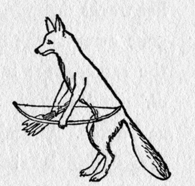
"Take this arrow and shoot it across the lake"
So Poh-ve took the arrow and shot it across the lake. The waters separated all along the path of the arrow, so that Poh-ve could cross on the bottom of the lake. She found the Governor just as the fox had told her and told him her story. He took her home to his house, where she was happy with his little girls.
Many days later when Pah-day came home from minding the sheep, he asked his step-mother, "Where is Poh-ve?"
"I do not know," she said, "she left home many days ago and I have not been able to find her since."
Pah-day was grieved and frightened, so he set out to hunt for her. After a long time he found her tracks down by the river and saw where she had gone across. He crossed the river, too, and found the same path; but when he reached the lake he did not know what to do, for there was no way to get across. "Surely, Poh-ve could not have gotten across this lake! Where shall I go now?" and Pah-day sat down to think.
Then a voice beside him said, "Good-day, young man, what makes you so sad?" He looked up and saw the fox with his bow and arrow.
"I am sad," answered Pah-Day, "because I have lost my sister and I do not know where to look for her."
"What is she like and when did you lose her?" asked Mr. Fox.
Then Pah-day told the fox what Poh-ve was like and when she had gone away.
"There is a village on the other side of this lake," said Mr. Fox, "Take this arrow and shoot it across the lake. Then go to the house of the Governor of that village and you will find your sister."
So Pah-day shot the arrow across the lake, and again the water separated along the path of the arrow, so that he could go across on the bottom of the lake. He went to the Governor of the village just as the fox had told him to do. He told the Governor about his sister and asked, "Is she here?"
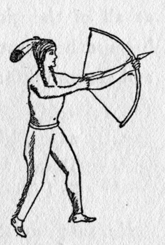
Pah-Day shot the arrow across the lake
"I think she is," replied the Governor, "Go into the house where all the village girls are grinding corn and see if you can find her. If she wishes to go home with you, you may take her."
So Pay-day went into the room where all the girls were grinding corn. Poh-ve saw him coming, so she held her head down. She knew he had come for her, and she did not want to go home to be alone with her step-mother again. Pah-day looked at all of the girls, but he did not see his sister because her head was down. Then he sat down and mournfully sang:
"When I come back from my hunting
And when I come back with the sheep,
There is no one to greet me or feed me
So I fall on my face and weep."
He sang so sadly and looked so grieved that Poh-ve ran to him.
"I ran away from our mean step-mother, Pah-day," she said, "and I do not want to return to her, but I love you and I will go back with you."
And the two set out for home together. When they reached the lake the fox was waiting for them.
"Here are the bow and arrow," said he.
Pah-day shot the arrow across the lake and all three of them went across together.
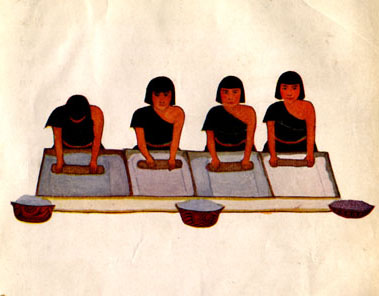
Poh-ve saw him coming, so she held her head down.
"You may have your choice of my cattle, Mr. Fox, for helping me find my sister."
So they took the fox and gave him a fat calf to eat, and he went away smacking his lips. When they crossed the river their father and step-mother ran to meet them. They were so glad to find Poh-ve alive that even the step-mother was pleased and treated her kindly ever after.
THUN-TSAY AND COHN-NAH
(Laguna Pueblo)
Long, long time ago the Laguna Indians used to live down by the ocean. One of the Indian men lived alone with his little daughter Thun-tsay (Sunlight). Thun-tsay did not have a mother. Her father thought she was lonely, so he brought a new mother to his house. This new mother had a little girl of her own, Cohn-nah (Darkness). She did many nice things for her Cohn-nah; but she treated Thun-tsay very unkindly. So Thun-tsay used to run away from her step-mother down to the beach, and make herself happy gathering shells and playing in the sand.

One day she found a little fish that had been left in a pool of water on the sand when the tide went out.
"Thun-tsay," said the little fish, "I am hungry. Won't you please give me something to eat?"
So Thun-tsay ran home and got bread crumbs for the little fish; and every day for four days she fed him. On the fourth day he asked her, "Please throw me back into the ocean and I will give you a present."
Thun-tsay picked up the little fish and threw him back into the ocean; and as she did so he said to her, "Go home and comb your hair and you will find my present."
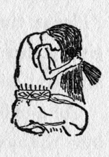
Thun-tsay ran home as fast as she could and got her bunch of straw, that she brushed and combed her hair with, and began brushing it at once. And as she brushed all kind of beautiful things fell out. She was rich with gifts and she had plenty to share with her father.
When her step-mother found out what had happened to Thun-tsay, she sent her own daughter Cohn-nah down to the beach to look for the little fish, so that he might give Cohn-nah presents, too.
She found the little fish once more in a pool of water.
"Please give me some food, Cohn-nah," asked the little fish, "for I am very hungry."
But Cohn-nah laughed and threw sand into the water. Then she went away and left the little fish.
Next day Cohn-nah went down to the beach where the little fish begged again for food; and again she threw sand at him. He begged her on the third day and on the fourth day he said, "Please throw me back into the ocean and I will give you a present. Go home and comb your hair and you will find my present."
Cohn-nah picked him up quickly and threw him into the ocean. Then she ran home and told her mother, "Get my comb. The fish has promised me a present, too." But when Cohn-nah combed her hair, it all fell out over the floor and there were no presents.
Her mother was angry and she treated Thun-tsay meaner than ever. So Thun-tsay began to go to the beach again every day to get away from her step-mother.
One day a big fish came up out of the water near her. "Thun-tsay," he said, "I am the little fish that you fed. I have grown to be chief of the fishes now. Won't you come down into the ocean with me and be my bride? I have beautiful things waiting for you."
So Thun-tsay jumped into the ocean and went down to live with the big Fish-Chief. She lived happily with him for a long time; until one day she grew homesick to see her father.
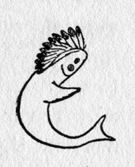
"Please let me go back home to see my father, Fish-Chief?" asked Thun-tsay.
"All right, you may go," said Fish-Chief, "and here are presents to take to him; but you must promise me to come back again at the end of six months."
"I will come back," replied Thun-tsay, so Fish-Chief took her up to the shore and she went home.
She found her father so sick from grieving over Thun-tsay's disappearance that even her step-mother was glad to have her return. Her father got well and Thun-tsay was again so happy that she forgot all about her promise to Fish-Chief.
But one day as she was walking along the beach, she saw poor Fish-Chief lying on the sand almost dead. He was grieving himself to death. Thun-tsay ran to him.
"I can not live without you, Thun-tsay. It is too lonely in my palace when you are gone. If you do not go back into the ocean with me, I shall die. You may live with your father half of the time; but if you do not come back to me for the other half I cannot live."

He was grieving himself to death
So Thun-tsay went back with Fish-Chief and lived happily ever after, spending half of the time in the Fish palace and half of the time with her father.
THE MEADOW LARK AND THE FOX
(Seama, a Laguna Pueblo and Cochiti Pueblo)
Long, long ago, in the time of my grandfather's grandfather, there was a drought over all of the land. A fox and her little foxes grew very thirsty; so the mother fox left her babies to go far away in search of water. She found a spring; and without drinking any herself, she filled her mouth with water for her babies, for she had no other way to carry it, and her babies would die for want of water.
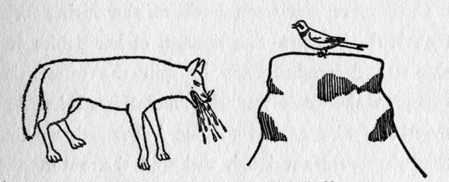
"Ha, ha!" laughed Mrs. Fox and spilled all of her water
As she was setting out for home a meadow lark, sitting on a rock, saw her and sang, "Fox, fox has a sharp mouth."
"Ha, Ha!" laughed Mrs. Fox and spilled all of her water.
Back she went to the spring and filled her mouth again. But when she passed the meadow lark, the lark sang out, "Fox, fox has a sharp mouth." And Mrs. Fox could not help laughing again. She lost all of the water in a big spray.
Once more she went back to the spring for a mouthful of water. She thought of her babies and she was determined not to spill the water this time; so she took wet clay and pasted her lips together. She wanted to glue her mouth shut so that she could not laugh and spill the water.
"Now, Miss Meadow Lark can try all she pleases to make me laugh," thought Mrs. Fox and she trotted along toward her babies.
"Fox, fox has a sharp mouth," once more sang Miss Meadow Lark.
Mrs. Fox tried hard not to laugh; but Miss Meadow Lark twisted her head on one side and sang again. It sounded so funny that Mrs. Fox just had to laugh. "Crack" went the clay on her lips and out spilled all of the water.
It was no use to try to carry water. Mrs. Fox just rolled and rolled over with laughter. Finally she got up and went home still laughing. She was laughing so that she had forgotten all about her babies. What a poor mother she was!
But when she reached her den, her laugh changed into a wail and poor Mrs. Fox rolled over and over in grief; for there were all of her baby foxes dead for want of water.
Very soon she grew so angry at the meadow lark that she wanted to go right away and eat her up. She ran as fast as she could to the rock where Miss Meadow Lark had been sitting; but Miss Meadow Lark had wisely flown away. So in her temper Mrs. Fox bit the rock until she injured her mouth and broke all of her teeth off.
Then she ran back to the spring for a drink of water, for by this time she was nearly famished. When she leaned over the spring to drink, there was another fox in the water with blood running out of her mouth. Mrs. Fox jumped back in horror, "The spring is poisoned," she thought, "I cannot drink there." And so poor Mrs. Fox ran away and died herself of thirst.
THE FATE OF THE BOY WITCH
(Hopi, Second Mesa)
Once upon a time — many, many years ago, — two Indian boys were in love with the same girl, Man-nah. One of the boys, Tee-yoh, had no mother and father. He lived with his grandmother outside of the village and they were very poor. The other boy, Poo-wah-ka, was a boy witch; but, as he looked just like any other Indian boy, nobody knew that he was a witch. He lived in the village.
Every day for many days Poo-wah-ka went to Man-nah's house to talk to her, but Man-nah did not like him so she would not answer him. One day when Man-nah was grinding corn beside her peep-hole window, Tee-yoh came to the window and spoke to her. Man-nah liked Tee-yoh so she talked to him. So for many days Tee-yoh came to Man-nah's house to see her.
This made Poo-wah-ka jealous, so one day he invited Tee-yoh to go hunting with him; and after they had been hunting for a while Poo-wah-ka said:
"I tell you what we can do, Tee-yoh. We can change ourselves into coyotes. The the rabbits will not hide from us and we can kill lots of them. I will show you how to become a coyote."
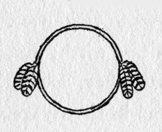 Then Poo-wah-ka took a hoop that he had been secretly carrying and jumped over it. Immediately he changed into a coyote. He handed the hoop to Tee-yoh, and as Tee-yoh jumped over it he changed into a coyote too. Then they ran off in different direction to hunt rabbits.
Then Poo-wah-ka took a hoop that he had been secretly carrying and jumped over it. Immediately he changed into a coyote. He handed the hoop to Tee-yoh, and as Tee-yoh jumped over it he changed into a coyote too. Then they ran off in different direction to hunt rabbits.
Tee-yoh killed so many rabbits that he could not carry them all, so he left them in a pile beside a rock while he looked for Poo-wah-ka. He was ready to change back to a boy and go home. But he could not find Poo-wah-ka, for Poo-wah-ka had been hiding and watching him. He had not killed any rabbits. As soon as Tee-yoh left his pile of rabbits, Poo-wah-ka slipped out from his hiding place and took the rabbits. Then he jumped over the hoop, changed himself back into a boy and ran home laughing to himself, "Now I shall have Man-noh for my girl, I guess."
He left poor Tee-yoh out in the fields without any way to change back into a boy. Tee-yoh tried to go back into the village to find Poo-wah-ka but the dogs chased him out. His grandmother was worried about him when he failed to come home, so she went to ask Poo-wah-ka what had become of him.
"I do not know where he is," replied Poo-wah-ka. "He is somewhere in the fields still hunting."
For days and days Tee-yoh searched for Poo-wah-ka and for the hoop. He could not eat raw meat like real coyotes, and he was afraid to roast the meat in case the Indians might see the smoke of his fire and shoot him. He dared not go back to the village for fear of the dogs , so he was starving to death. Every night he slept in the middle of a grass patch, and one morning he was so weak for want of food that he could not get up. Tee-yoh was dying.
The eagles up in the heavens, who see and know everything, saw Tee-yoh in his distress. They knew what had happened, so they sent their swiftest eagle down to him. Tee-yoh heard a thunderous noise, like a snare drum nearby. He looked up quickly and saw the eagle swoop down beside him. "Do not be afraid. I have come to help you, Tee-yoh. You changed yourself into a coyote because you believed in Poo-wah-ka and thought he was your friend. Here is a little corn meal mush to strengthen you. Eat it quickly , for we must hurry. Right now Poo-wah-ka is talking to Man-nah. He has told your grandmother that he does not know where you are, and she is sick with grief. Get on my back, the eagles are waiting for us."
Tee-yoh climbed on the eagle's back and he circled around and around, higher and higher with him, until they reached the eagles' village up in the heavens. Up there the eagle messenger took him into the chief's house.
When Tee-yoh saw the eagle men and eagle women and the eagle boys and eagle girls all walking around without their eagle feather coats — for the eagles took off their feathered coats and hung them up on the wall when they were in their houses — he was frightened.
"Do not be afraid, Tee-yoh. You are welcome to our village and we have brought you here to help you," said Eagle-Chief.
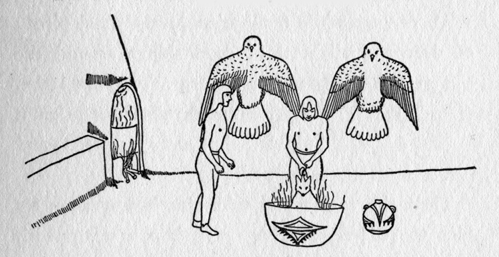
He pulled all of the coyote skin off
The eagle-messenger brought in hot water and put Tee-yoh into a big jar full of it. Then Eagle-Chief took a dried herb shaped like a hook and twisted it around in the coyote skin on top of Tee-yoh's head. He pulled on the hook and pulled all of the coyote skin off, so that Tee-yoh was a boy once more.
The eagles washed him clean and gave him fine new clothes of buckskin and eagle feathers. The eagle girls washed and combed his hair; and then they all had a big feast of deer's meat.
There were white mountains, lovely trees, plenty of deer and all sorts of good things around the eagle village. The feast lasted for four days. Tee-yoh had a fine time and grew strong and well.
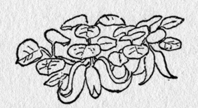
Herbs shaped like hooks
Then the eagle chief told him it was time for him to go home. They gave him a deer which they had killed for him, and a tiny buckskin bag of herb-medicine.
"When you reach home, Tee-yoh," said the Eagle-Chief, "Poo-wah-ka will be the first person to come to see you. Do not tell him where you have been; but invite him to come to eat deer's meat with you. Then when he comes to the feast put this medicine on his meat."
So the eagle who had brought Tee-yoh up into the heavens took him, with his deer, on his back and flew down to the edge of the Indian village. There he left Tee-yoh.
Tee-yoh hurried to his grandmother's house and found her lying on her blankets sick from grief; but she was so glad to see her grandson that she soon grew better.
Sure enough, just as Eagle-Chief had told him, Poo-wah-ka was the first person to come to see him. He was surprised to see Tee-yoh for he thought that he was still a coyote if he were not already dead.
"Where have you been, Tee-yoh? We have been looking for you," said Poo-wah-ka, deceitfully.
"Oh, I have just been hunting deer," replied Tee-yoh, "I have a fine deer. Come over to my feast tomorrow."
Next day when Poo-wah-ka came to the feast, Tee-yoh did as Eagle-Chief had told him and put the medicine on his meat; and when Poo-wah-ka ate the meat he turned into a coyote. He began eating like an animal and lapping up water with his tongue. When he did Tee-yoh picked up a stick and drove him outside. The dogs in the village saw him and chased him away into the fields. He could never come back again.
Some time after that Tee-yoh and Man-nah were married and lived happily ever after.
JUAN HALF-BEAR
PART I
(Cochiti Pueblo)
I am going to tell you something: many, many years ago, an Indian went out hunting in the mountains and lost his way. For days he wandered around among the trees and at night slept on the ground, until he grew very tired, cold and hungry. Finally one evening he saw smoke. He ran swiftly over to the place whence the smoke came, and there he found two bears cooking their evening meal.
"I am lost, Mr. Bear," said the man, "and I am starving to death. Please give me food and shelter for the night?"
"You are welcome to our home and board, Mr. Man," replied Mr. Bear; and Mrs. Bear immediately gave him some of their freshly cooked supper.
All winter the bears kept the man in their cavehouse and shared their food with him. When spring came the man said, "I am going back home now. What can I do to repay you for all of your kindness to me?" Mr. Bear replied, "You can plant a field of corn for our food next winter when you go back to the Indian village." And the man went back to the village and planted the field of corn.
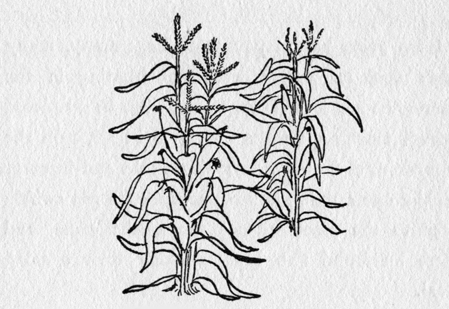
In the fall when the corn was ripe
In the fall when the corn was ripe for gathering, the man said to the Indians in the village, "I am going up into the mountains to hunt today. Tomorrow I shall bring two bears to my corn field. All of you form a circle around the field and catch them when they come."
So the man set out for the bears' house in the mountains. When he reached there, he found two baby bear cubs that had come since he had gone away. "All the better," he thought, "now we shall have four bears instead of two to eat this winter."
He spent the night with the bears. Early the next morning he said to them, "Let us go down to the corn field today, for it is ready to be gathered."
The bears were greatly pleased; so Father Bear, Mother Bear and the two cub Bears walked along happily behind the man. They had scarcely gone into the corn field when they heard a loud hunter's yell, and Indians rushed upon them from all sides with bows and arrows and tomahawks. Father Bear was killed; but Mother Bear struck the man who had deceived them with a great blow of her paw. She tore open his chest, snatched out his heart and she and the baby bears ran safely away.
When they reached their cave-home in the mountains there was no one to find food for the family, so Mrs. Bear took the man's heart and changed it into a boy that was half-man and half-bear and named him Juan Half-Bear.
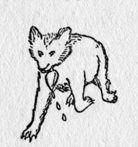
She snatched out his heart and ran away
"Now," said Mrs. Bear to Juan, "you have the virtues of the man without his vices and also the good traits of the bear. I will teach you to hunt; and after you have provided us with food enough to atone for the trouble your wicked heart caused us, you shall be free to go wherever you please."
So Juan helped the bears for many years until he grew into young manhood and then he went away to seek his fortune.
JUAN HALF-BEAR
PART II
(Cochiti Pueblo)
I am going to tell you something: once upon a time an Indian man and woman lived near the village of Kotyete. They had a good home, cattle, sheep, corn fields, chickens, skins and blankets; but they had no children. They were growing old. Every day they prayed to the Great Spirit to send them a son, so that they might have someone to leave all of their good things to when they passed away to the Great Spirit's home. They went to all of the sacred dances and always prayed for a son.
There also lived near Kotyete a young man, who was half boy and half bear. It was Juan Half-Bear; but none of the Indians had ever seen him, for he hid away in the mountains. One day when the man and woman were in the village dancing in a sacred dance, this half-boy and half-bear went to their house. He wanted to live among the Indians; so he crawled into an open window to look around and see how they lived, so that he might do likewise. But while he was in there he heard the man and woman coming home, so he hid himself under a pile of blankets. The old people knelt down beside that same pile of blankets to say their daily prayer for a son.
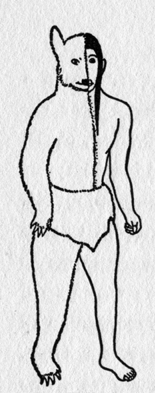
Juan Half-Bear
"Great Spirit, we have tried to live at peace with all of our brothers; we have worshipped you in dance and in song; please send us a son to take care of and keep all of the good things you have given us!"
Then as they were getting up, the old woman saw the boy under the blankets. She was frightened and called to her husband to "Look!"
"Do not be afraid," said the boy, "I am Juan Half-Bear. I have come to be your son. I have a home with many skins in it. Let the old man come with me and I will show them to him; and then if he is pleased with me, I shall come to live with you and be that son for whom you have been praying."
So the old man went with Juan Half-Bear to his home in the mountains. In the first room that they entered there was nothing; but in the next room there were many skins just as Juan had said. Juan seemed to be good and capable, so the old man took him back home with him.
"Wife," said he, "I like Juan Half-Bear. He seems a good boy and thrifty, for he has many skins; so I have brought him home with me to be our son."
Many days after that, all of the young Indian men of the village, including Juan Half-Bear, went out on a hunt to get meat for food and skins for clothing and beds. They camped up in the mountains and every day a young man was left in camp, while the others hunted, to cook for the hunters and to watch the game that had been killed.
Each day for four days the young man who was left in camp mysteriously fell asleep while their food was cooking; and something, that made no noise and left no tracks, came and stole all of the food and all of the game that had been killed. Each day the young men promised and determined not to go to sleep; but each day something made them go to sleep against their will.
On the Fifth day Juan Half-Bear's turn came to stay in camp. "I shall not go to sleep," he said "and I shall find out what this is stealing all of our things."
So Juan set to work to build a fire and cook some deer meat. Suddenly he felt himself growing very sleepy on his man's side. He grew so sleepy that he had to lie down and let his man's side go to sleep; but his bear's eye stayed wide awake.
Very soon a witch-giant came out of the woods and took away all of the meat and the deer that had been killed. Juan Half-Bear jumped up and followed him. The giant went into a big cave. The floor of the cave was covered with prickly cactuses. The needles on the cactuses stuck Juan's man-leg so bad that he could not stand the pain in that leg; but they could not hurt his hairy bear-leg, so Juan hopped on his bear-leg and followed the giant through the cactuses. When the giant saw Juan following him he laughed "Ha, Ha!" in a loud terrible voice; for he thought that he could soon put an end to Juan. Then the giant rolled a stone away from the door and went into another room. He thundered to Juan, "Now follow me in here if you dare!" Juan did dare to follow him; but just as he entered the door two mountain lions jumped at him. Juan turned his bear side to the lions and killed them both.
The giant went into another cave room. Juan went in, too. He was determined to catch and kill that giant and take back the Indians' deer from him. Two more mountain lions sprang at Juan; but Juan was too quick for them and he killed them, also. Then he grabbed the giant and killed him in a big bear hug.
In that last room Juan found many fine skins and all the deer that the witch giant had stolen. He took all the things that he found back to camp with him.
When the hunters returned he had delicious roasted meat ready for them. He told them about the witch-giant and shared with them all the things he had brought from the cave.
So when the hunters returned home, the Indians had a big buffalo and deer dance; and they made Juan Half-Bear their great War-Chief.
THE MAN FROM THE NORTH, THE GIRL AND THE TURTLE
(Picuris Pueblo)
Once upon a time an Indian lived all alone away up in the North, where it snows and rains all the time and is very cold indeed. He went south and married a wife. He brought her to his home to keep him company; but she soon died because of the cold.
The Indian was so lonely after that that he went out in search of another wife. This time he went to the East. After he had been traveling for a long distance, he went up on a hill and looked all around. He saw smoke, so he went to see whence it came; and he found a little house where a young girl lived all alone.
"Come in," she said, when he knocked on her door. She was lonely too; so when the man asked her to go to live with him and be his wife, she went.
Soon after they reached the man's house away up north, the man showed his wife where the corn was, so that she could grind some into meal for bread, while he went out to hunt to get meat for their dinner.
The new wife sat down behind the grinding stones and tried to grind some of the corn, but her fingers soon grew too stiff from the cold. She grew colder and colder; and when the man came back from hunting he found her frozen to death.
So again the man set out, to find a third wife. This time he traveled to the West. He walked for many days until he came to a woman hoeing corn. He looked tired, so the woman invited him to come into her house and rest a while. She called to her daughter to cook something for the stranger to eat. While he was eating he watched the young girl as she moved about the house, and he liked her very much. When he finished his meal he asked the girl:
"Won't you go with me to my house in the north and be my wife?"
"No, I am sorry but I do not wish to go," she said. But her mother liked the stranger, so she made her daughter go with him.
While they were journeying northward the sad-hearted girl heard some one calling her. She looked all around and finally she saw a turtle.
"Where are you going, my sister?" asked Mrs. Turtle," and why do you look so sad?"
"I am going into the cold Northland," replied the girl, "to be the wife of that man walking in front of me. He is good to me; but I am unhappy because I do not want to go and my mother has forced me to. I am afraid of the cold."
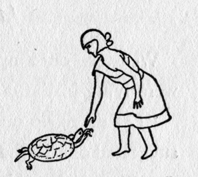
"Take this herb with you"
"Do not be unhappy and do not be afraid," said Mrs. Turtle, "Take this herb with you; and when you reach your new home, make some tea of it and sprinkle the tea in all directions." The girl took the herb and journeyed on to her new home. When the man went out to hunt, she did as Mrs. Turtle had told her; and, behold, the house grew warm and comfortable and the girl was happy ever after.
THE DEER AND THE COYOTE
(Jemez Pueblo)
Wen-ter — once upon a time — long ago, six deer were lying in the sand talking and resting.
"Let us go up on the mountain top and dance," suggested one of the deer .
"All right," said the others, and they went to a broad sandy place on the mountain top and began to dance and sing:

Mr. Coyote heard the deer singing, so he ran up on the mountain.
"Good-day, Messrs. Deer, how happy and cheerful you sound. Let me dance with you."
"I am sorry," replied the Chief of the Deer, "but nobody can dance with us who hasn't antlers on his head."
"Won't you make me some antlers, so that I can dance?" asked Mr. Coyote.

"Won't you make me some antlers?"
"Certainly, I can do that," replied Deer-Chief. So he took a sharp stone and sharpened the ends of two sticks; and then he hammered the sharp ends of the sticks into the coyote's head to make antlers for him.
Then Mr. Coyote joined in the dance, expecting very soon to grab one of the little deer and run away with it; but he only danced around the circle once before he dropped in a faint from the sticks in his head.
He rolled over and over down the mountain side until he was covered with bruises, and he had to rub himself with herbs for many moons.
THE BOY AND THE PIG
(Seama, a Laguna Pueblo)
Once upon a time there lived at Laguna a lazy, kind-hearted boy. He lived alone with his grandmother. Every day she begged him to go help the other boys cut wood or work in the corn fields; but the boy would not go. So he did not have the good things that the other boys had who worked. Instead he was always poor and ragged; but he was always generous with what he had.
One day as he was idly walking outside the village, he saw a pig.
"Please scratch my back for me, Boy," asked the pig. "I have begged everyone who passed and no one will scratch it for me." And the boy scratched the pig's back for a long time.
The next day he scratched the pig's back again, but he did not seem happy.
"Why are you so sad, Boy?" asked the pig.
"I am sad," replied the boy, "because today is the Sia feast day, and I want very much to go to the dance; but I have no way to go."
"Take that whip lying there," said the pig, "and strike me across the back."
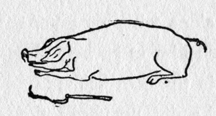 "Oh, I cannot do that!" said the boy; but the pig insisted, so the boy took the whip and struck the pig across the back. Immediately a fine horse appeared, and the boy's ragged clothes changed into a new beaded buckskin suit. He mounted the horse and rode happily away to Sia.
"Oh, I cannot do that!" said the boy; but the pig insisted, so the boy took the whip and struck the pig across the back. Immediately a fine horse appeared, and the boy's ragged clothes changed into a new beaded buckskin suit. He mounted the horse and rode happily away to Sia.
When he returned home that night his grandmother asked, "Where have you been all day today, my grandson?"
"I have been to Sia to the feast," he said.
"That cannot be true for you had no way to go," replied his grandmother, and so she did not believe that he had gone. She grieved because she thought her grandson was not truthful.
Four days later when the boy was with the pig, the pig asked him again, "why are you so sad today, Boy?"
"I am sad because I fell in love with the Chief's pretty daughter at Sia, and I am too poor to ask her to marry me."
Again the pig told him, "Take that whip and strike me across the back with it."
The boy did as he was told; and this time two fine horses appeared and the boy's clothes were once more changed into fine new buckskins. He mounted one of the horses and led the other horse over to Sia.
He went straightway to the Chief's house and asked him for his daughter. The boy looked so fine and had such good horses, that the Chief told him at once that he might have his daughter. The daughter was willing to go, too, so they rode back to Laguna.
When they reached there the pig had disappeared; and in the place where he had been a house, with cattle outside and with blankets inside, awaited the boy and his bride.
THE FOX AND THE CROWS
(Taos Pueblo)
Once upon a time a group of jolly, happy crows were playing leaf-ball in the forest. They were having such a good time when Mr. Fox came slipping along. The crows saw him and started to fly away.
"Oh do not go away," called Mr. Fox, "I only came to play ball with you."
"Well, you will have to have a ball to play with," said the crows, and they jumped upon his head and picked out one of his eyes.
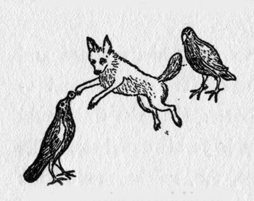
Mr. Fox trying to catch his eye
They tossed the eye from one crow to another, laughing at poor Mr. Fox, who was jumping around in all directions trying to catch his eye. When they grew tired of playing, they hid the fox's eye and all of their leaf-balls; flew away, cawing as they went, "We don't want to play with you, old Fox. You are too mean. Keep away from here."
And poor Mr. Fox was left searching for his hidden eye and grieving himself sick.
THE RABBIT AND THE CROW
(Jemez Pueblo)
Once upon a time a rabbit lived all alone. Some times he felt very lonely. One day when he was lonely he picked up his drum and went outside to sing. He sang:

A crow was flying near by and heard Mr. Rabbit singing and beating his drum. He flew down at once:
"That drum annoys me, Mr. Rabbit. You shall not beat it," said Mr. Crow. Then he caught Mr. Rabbit's right arm, pulled it out and ate it.
Next day Mr. Rabbit came out of his hole and beat the drum with his left arm as he sang his song.
The crow heard him again. He flew down and pulled out Mr. Rabbit's left arm and ate that up.
"I told you not to beat that drum," he said.
On the third day Mr. Rabbit beat the drum with his right foot, and Mr. Crow flew down and ate his right foot up. And on the fourth day he ate up the rabbit's left foot.

So the fifth day Mr. Rabbit came out to sing. He beat the drum with his head. Immediately Mr. Crow heard him and flew down. He bit off Mr. Rabbit's head and ate it; and then he picked up what was left of poor Mr. Rabbit and carried him up to his baby crows in the nest.
THE FATE OF THE WITCH WIFE
(Seama Pueblo, San Juan Pueblo, Sia Pueblo, and Hopi, Second Mesa)
A long time ago a woman named White Corn spent all of her days cooking. She would cook piles of food that she never offered to her husband, Redflower; but since the food always disappeared, Redflower began to wonder what became of it. So one evening he decided that he would watch the pile of food and see where it went. He took off his moccasins at bedtime and lay down as usual on his blankets. Then he pretended to go to sleep. White Corn waited until she thought he was asleep, then she took out her eyes, put them under her blankets, put owl's eyes in their place, and then put an ear of corn down on the blankets beside Redflower. "Corn," she said, "if Redflower should say anything to me during the night, answer him for me." After that she put all of the food she had cooked into a basket and went out.
Outside an owl met her and the two walked away across the prairie together.
Redflower jumped up off his blankets and followed them. After a long walk they went into a cave, where there were many other people all with owl's eyes; for they were all witches. The witches had taken off their blankets when they went into the cave and thrown them into a big pile by the door. Redflower slipped quietly into the cave and hid himself under the blankets.
Very soon the Chief-Witch called the council to order. "Ha," he cried, "I smell fresh blood. I smell human flesh. There is a man inside. Let us find him!", and so the witches began to look everywhere for the man. They discovered Redflower under the blankets and pulled him out.
"Why do you hide, Brother?" said the Chief-Witch, "You are welcome to our council; but first you must bring to us the heart of the person whom you love best of all in the world. That is the price you must pay for having come among us. Hurry and return with it before daybreak."
Redflower went away very sad. He dared not disobey the witches, for it would mean torture and death to him to do so. He loved his sister better than anyone else, and he could not kill her in order to take her heart to the witches. "What must he do! " Then he remembered his big red rooster. He hated to kill his rooster; but he had to carry a freshly bleeding heart to the witches, so he went to the chicken house and killed him.
When he returned to the witches' cave with the heart, there were other new members there with freshly bleeding hearts.
"Now that you have brought the hearts of the persons whom you love best," said Chief-Witch, "you must be initiated into our order by passing with us under the rainbow at the other end of the cave."
The witches all formed in line and passed under the rainbow. Each witch turned into an animal. There were coyotes, foxes, bears, hawks and owls. When Redflower passed under he became a coyote.
"Now, animals and friends, let us test the new hearts," and Chief-Witch took a sharp stick and thrust it into each of the newly brought in hearts. The other hearts cried out like humans in agony; but Redflower's heart squawked like a rooster.
"He has deceived us!" cried all of the witches. But they went on with their ceremonies. After a short time, however, the witches told Redflower that he might go to sleep, since he was not yet accustomed to staying awake all night; so they fixed a bed of blankets for him, and he went to sleep.
While Redflower was asleep the witches took him and laid him on a narrow shelf of rock half way down a steep cliff at Grand Canyon, and left him there. When Redflower awoke and found himself in such a perilous position, for he could not even move or he would have fallen off onto the rocks far below, he began to mournfully sing:
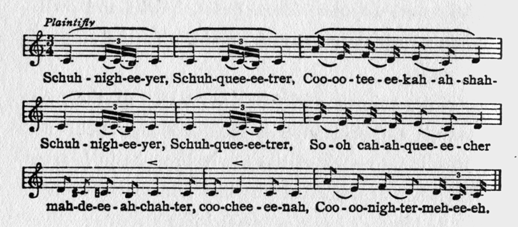
"Mother, Sister, she will harm me.
Mother, Sister, she will take my heart out.
It will kill me to take my heart out.
White Corn will harm me!"
The little chipmunks in their village among the cliffs heard Redflower singing. The ran out of their houses in such a hurry to see what the noise was, that they ran over Grandmother Chipmunk's freshly moulded pottery and spoiled it all.
"Go," said Grandmother Chipmunk to one of the chipmunk boys, "and see who that is in trouble! Perhaps we may be able to help him."
So Chipmunk ran up the cliff to Redflower. Redflower told him what had happened, and Chipmunk hurried down into the canyon to Grandmother Spider.
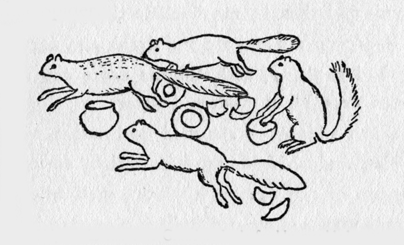
The little Chipmunks ran over Grandmother's freshly molded pottery and spoiled it
"Grandmother Spider," he said, "the witches have left Redflower on a ledge of rock to die. What shall we do?"
Grandmother Spider hurried into the house and brought out an acorn of water and an acorn cup of corn meal mush. "First of all," she said, "take this to him and tell him to eat. Then come back to me."
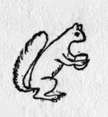
Chipmunk took the acorns to Redflower.
"Oh, Chipmunk, I am starving! This will not even be a taste for me; but I thank you just the same."
"Grandmother Spider says eat it," replied Chipmunk and then he ran back to the Spider village.
Redflower ate and ate and drank and drank until he had a plenty, and still the acorn cup and the acorn were full of mush and water.
When Chipmunk returned he brought with him a pine seed. He dropped it straight down to the bottom of the canyon from the shelf where Redflower was, and immediately a pine tree began to grow. "The witches will come this evening," said the Chipmunk, "and drop food down from above. They want you to try to catch it so that you will fall off and be killed. Grandmother Spider says for you to shut your eyes and pretend to be asleep when they come, and do not reach out for the food they drop."
Sure enough that evening the witches came and dropped buckskin bags of food down the cliff, but Redflower kept perfectly still until they went away.
The next day Chipmunk brought fresh food. "Beware of the witches again tonight," he said. Then he ran up and down the growing pine tree, chanting a song as he ran and the tree grew and grew.
The witches came again that night and dropped more food over the cliff; but Redflower kept his eyes closed. He heard Chief-Witch say, "It is strange that Redflower is not hungry. He does not even try to catch the food. He is not dead for I can smell his fresh blood. Let us plan some other way to get rid of him." And the witches went away.
The third day Chipmunk came again with food from Grandmother Spider. This time he brought with him some herb medicine. "The witches will come tonight as snakes," said the Chipmunk, "and will crawl down and try to push you off this ledge. Take this herb juice. When the witches come down, sprinkle it on them." Then Chipmunk ran up and down the big pine tree chanting his little song and the tree continued to grow and grow.
That night the witches came. Two of them were snakes, who crawled down the face of the cliff to Redflower to push him off onto the rocks below; but Redflower sprinkled them with the herb juice and both of them fell dead, away down into the canyon. Then the other witches were afraid and ran away.
The next morning the tree had grown up to where Redflower was lying. Chipmunk came early and ran down the tree, but the top bent under his weight. He ran down four times chanting; and each time the tree grew stronger and stronger, until after the fourth time it was strong enough to hold up Redflower.
"Come on," said Chipmunk to him, "Grandmother Spider is waiting for us."
So Chipmunk and Redflower climbed down the pine tree and went to the Spider's village in the canyon.
Old Grandmother Spider met them at her door: "Come in," she said, "I have been waiting for you and I have a feast already prepared."
For four days Redflower stayed with the spiders in their village. They gave him good food and new clothes of buckskin. On the fourth day Grandmother Spider said to him, "It is time now for you to go back to your home. Take this shiny disc with you and wear it on your breast. When your wife sees you and begs for it, roll it to her and she will receive her just punishment. Now, good-bye to you!"
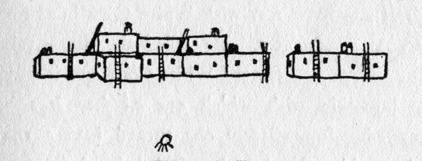
The spider's village
So Redflower set out for his home. When he drew near some one saw him and called to White Corn: "Your lost husband is returning home again." White Corn with her two sisters, who had been helping her to grind corn, ran out of her house. They saw the wonderful shining circle on his breast.
"Oh please, give that shiny circle to me?" each one cried.
"I cannot give it to all of you," replied the man, "but if you will stand in a row facing me in the plaza, I will roll it toward you, and whoever catches it may have it."
So the three sisters stood in a row with White Corn in the center. He rolled the disc straight toward White Corn and it struck the buckskin with which one of her legs was wrapped. Immediately she turned into a snake with a shiny head and wriggled hurriedly away. And ever since that time rattle snakes have had shiny heads.
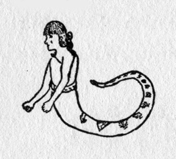
GREEN CORN, YELLOW CORN, AND THE DANCING FOX
(Picuris Pueblo)
Once upon a time a young fox lived with his grandmother near Nambe. He went out for a walk one day. Very soon he came to a fence where some choke cherries were growing: "I shall adorn myself with these like an Indian," thought young Mr. Fox, "and go over to Picuris to see those two pretty Corn girls." Now his grandmother had warned him to keep away from the Indians, for they would kill him; but "Grandmother is old," he thought, "and doesn't know." So he picked some twigs of cherries and fastened them in his hair, in his belt, on his shoulders and around his ankles. Then he mashed some cherries, and rubbed them over his body and hands to paint himself like an Indian. When he was all decorated he danced off to Picuris singing:

Yellow Corn and Green Corn were in their house grinding corn when they heard Mr. Fox's singing.
"Mr. Fox is calling our names," said Green Corn, "Let us go up and see where he is."
So the two girls climbed up on top of their house. Mr. Fox was below dancing as hard as he could. The girls cried, "Come up here, Mr. Fox, and dance for us!"

Mr. Fox came up on the ladder and began dancing on the roof
Mr. Fox felt flattered so he came up the ladder and began dancing on the roof.
"Dance hard, Mr. Fox, dance hard!" laughed Green Corn and Yellow Corn. And Mr. Fox danced so hard that he fell off the roof. But he jumped up from the ground where he had fallen, climbed up the ladder, and danced and danced again on the roof.
When the Corn girls grew tired of his dancing, they grabbed poor Mr. Fox, took all of the choke cherries off him and ate them up.
The people in the village heard the girls laughing, so they came out to see what was the cause of so much merriment. The men ran for their bows and arrows, and poor Mr. Fox just did get away alive from all the arrows that flew after him.
He bathed his wounds in the spring on his way home and decided that ever afterward he would pay more attention to what Grandmother Fox said.
A LITTLE CINDERELLA
(Picuris Pueblo)
Once upon a time Yellow Corn and Blue Corn had a little sister whom they treated very unkindly. They made her live out in the turkey house, where she had to eat with the turkeys, and they did not give her any clothes to wear except a few of their old ragged ones.
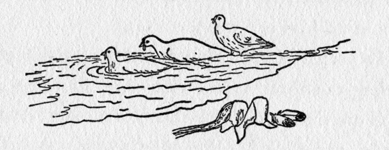
They jumped into the spring to bathe
Every day this little girl had to go out with the turkeys and watch them to keep them from wandering away and getting lost. One day the turkeys led her to a spring. They jumped into the spring to bathe and each turkey dropped something nice for their kind little keeper. The first turkey dropped some pretty feathers as he jumped into the water; the second turkey dropped a pair of moccasins from his feet; the third turkey dropped a belt; and the fourth turkey, a new black dress. The little girl was very happy. She dressed up in the new clothes and set out for home with the turkeys.
Some children in the village saw her coming. "Oh look!" they cried, "There comes Yellow Corn's and Blue Corn's sister all dressed up in some new clothes!"
Yellow Corn and Blue Corn heard them and ran out to see if what they heard was true. When the saw the new clothes they ran to their little sister:
"How lovely your clothes are!" said Yellow Corn, "Come, go into the house with us and let us see them."
"Yes," said Blue Corn, "Come in and we will give you some corn cakes and deer's meat."
"No, thank you," replied the little sister, "I had rather stay with my turkeys and eat with them just as I have always done." For she knew that Yellow Corn and Blue Corn would be unkind to her again as soon as her clothes grew old, and perhaps they would take her clothes away from her if she went in; but the turkeys had always treated her kindly.
"Well, go on then with your old turkeys," said the Corn girls, and they picked up handfuls of pebbles and threw them at the little girl and the turkeys.
Early the following morning the little girl said to the turkeys, "My sisters are so unkind to me that I am going into the hole (The hole that swallows people down and they never come back again); but do not follow me. They will be mean to you, too, when I am gone, so do not let them catch you. When they chase you, fly away to the north, the south, the east and the west." And the little girl and the turkeys went out towards the hole. They walked along singing. The little girl sang: "Turkeys, turkeys, leaf on water. Turkeys, turkeys, leaf on water. See how it floats so light. See how it floats so light," and the turkeys answered, "Piu, piu, chow, chow."
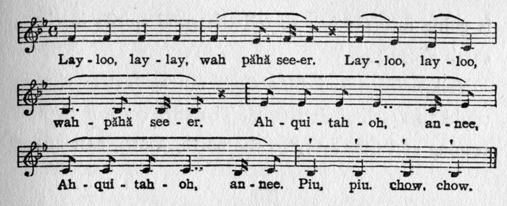
When they reached the river they met an old man with a load of wood on his back: "Where are you going with your turkeys, little girl?" he asked.
"I am going into the hole," she replied, "My sisters are so unkind to me that I am not happy, so I am going into the hole."
The old man put down his wood and hurried to the village to find Yellow Corn and Blue Corn.
"Go catch your sister!" he told them, "and tell her you will not be unkind to her any more; for she is going into the hole to tell the good spirits in the earth about you."
Yellow Corn and Blue Corn ran as fast as they could to catch their sister. The turkeys saw them coming and flew away to the north, south, east and west. When the overtook the little girl she was almost down in the hole. They caught her by the hair and tried to pull her out. "Come back, little sister and we will be good to you." But the little sister knew better than that.
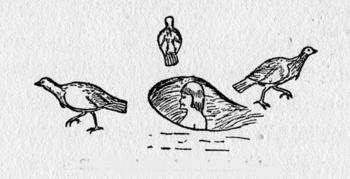
She was almost down in the hole
"How can I come out if you hold my hair? Please turn it loose," she said.
The girls thought she was coming back so they turned loose her hair; but the little sister disappeared out of their sight forever and lived happily with the good spirits in the hole.
THE BOY, THE COYOTE AND THE MAGIC ROCK
(Seama, a Laguna village)
Long, long ago a boy lived with his grandmother. He was a good boy so that all of the fairies of the wood were kind to him, especially the fairy who lived in a big rock on the side of a cliff.
One day the boy said to his grandmother, "Grandmother, let us invite our neighbor Mrs. Coyote and her baby coyotes in to dinner with us today. They seem lean and hungry of late. She must have a hard time providing food for so many." So the boy went over and invited the coyotes to dine with him.
After they had eaten all the food in the house, the coyotes still seemed hungry; so the boy invited them to go outside where he could get them more to eat.
"Little fairy in the rock," he called, "come down with your table!" And a big rock table came down from the cliff-side laden with good things to eat. The hungry coyotes had a wonderful feast.
Several days later Mrs. Coyote returned the favor and invited the boy and his grandmother to have dinner with her. She served a very poor dinner because she thought she could do as the boy had done, and get the little rock-fairy to bring down a table of good things. So after they had finished their poor meal, Mrs. Coyote invited her guests to go outside with her.
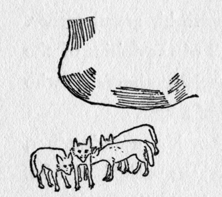
Down fell a big rock right on top of the baby coyotes
"Little Fairy in the rock," she cried, "bring down your table!"
But the table did not come. Mrs. Coyote called four times and then she yelled, "Bring down that table, I say!"
Then down fell a big rock from the cliff right on top of the baby coyotes, who were huddled all together under the cliff waiting for the table. The rock was so big and fell so hard that it killed every one of them, and reminded Mrs. Coyote that fairies were gentle creatures and must be treated in a kindly manner.
THE BAD LITTLE GIRL OF ACOMA
(Seama, a Laguna Village)
Once upon a time there lived in Acoma a very bad little girl. Her mother sent her out one day to mind the turkeys while they grazed; but she played around and did not watch the turkeys at all. That evening when she came home one turkey hen was missing.
"Go and find that other turkey," said her mother, "and bring her home before a coyote gets her."
But the bad little girl did not obey her mother. She went outside, took off her belt, her top black dress, her kerchief and her moccasins and slept all night under the ladder. Early the next morning she went out to find the turkey. The turkey hen was keeping an egg warm on her nest in the hole of a big rock. When the bad little girl found her, she grabbed her up by the neck; and then with the turkey hen under her arm and the egg in her hand, she started across the prairie singing:

"I am going East to jump in water, water."
"Toe, toe, toe, toe," said the turkey.
"Shut up, you ugly old thing," said the bad little girl, slapping the poor turkey's head at the same time. "You caused me to get a scolding last night, so I am going to drown you and this egg of yours in the water."
Then the little girl sang again and slapped the turkey whenever she cried, "Toe, toe, toe, toe." An old man with a load of wood on his back passed them.
"Why are you going into the water, little girl," asked the old man.
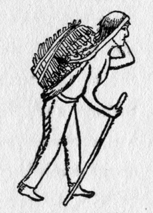
An old man with a load of wood on his back passed them
"So that I can be sure to drown this hateful old turkey," replied the bad little girl.
"Don't be foolish, Child," said the old man, "Come go home with me!"
"No," replied the bad little girl, "you leave me alone. I am going into the water, I tell you, to drown myself with this old turkey that caused me to get a scolding; and make my mother unhappy for scolding me."
So on went the little girl still singing and slapping the turkey.
The old man dropped his wood and went as fast as he could to tell the little girl's mother what he had seen and heard. The mother picked up the little girl's clothes and hurried after her; but before she reached the water, she saw the bad little girl throw the turkey's egg into the water, then the turkey and, last of all, jump in herself. The water swallowed the little girl up before her mother could reach her.
"Oh, Water God," cried the mother, "give me back my little girl!"
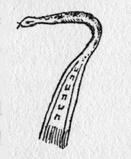
But the little girl did not come back. The mother threw the girl's dress into the water, hoping to bring her back, but it turned into a deer and ran away. She threw the moccasins in and they turned immediately into two bears. Then she threw in the kerchief. It turned into green slime on top of the water. Finally she threw in the belt and it changed into a water snake. Nothing could bring the bad little girl back, for she was far too mean to live.
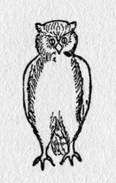
GLOSSARY
Pueblo and Plaza: The Pueblo Indians of the Southwest get their name from the communal houses in which they used to live at the time of the first Spanish exploration. Pueblo is the Spanish word for people. The Indians lived in houses two or three stories high, all joined so as to form one or two large, irregular, flat-topped buildings. When the Spaniards first saw them they called them "People houses;" and since an Indian village consisted of nothing more than these large houses with an open court somewhere inside, which is still called by the Spanish term, the plaza, where many of their celebrations and ceremonies take place — the village itself soon became known as a pueblo; and the Indians as Pueblo Indians. The only examples of these old communal houses in use today are to be found in Taos, Acoma and among the Hopi and Zuñis. In Taos, in the north central part of New Mexico, practically all of the inhabitants live in two large structures. Formerly, the entrance doors were all on top of the houses, so that one could get in only by climbing crude ladders to the flat roofs and descending other ladders into the inside.
Adobe: The word adobe is "traceable to an Egyptian hieroglyph signifying "brick;" thence to Arabic, whence the Spanish adobar, "to daub," "to plaster," adopted in the United States from Mexico. The Pueblo houses, called adobe houses, are made of wooden beams, etc., and adobe bricks. These bricks are made of a peculiar clay, known in the Southwest as "adobe clay" because of its use, mixed with wheat straw and sunbaked in the same fashion as the bricks made by the Israelites for the Egyptians. After the brick walls are laid they are plastered over both inside and outside with adobe clay and frequently washed with white gypsum on the inside. The women usually do the plastering and they use their hands as trowels.
Pueblo Indians: There are five branches of the Pueblo tribe of Indians living in New Mexico and Arizona, each speaking a different dialect: The Tanos, divided into the Tiwas and Tewas; the Queres; the Hopis; the Jemez; and the Zuñis. The Tiwas comprise the villages of Taos, Picuris, the two Isletas and Sandia; the Tewas comprise San Juan, Santa Clara, San Ildefonso, Nambe and Pojoaque; the Queres comprise Cochiti, Santo Domingo, Sia, San Felipe, Santa Ana, the Laguna villages and the three Acoma villages; the Jemez in Jemez village; the Hopis (Moquis) living in nine villages on First, Second and Third Mesas in Arizona; and the Zuñis, with whom this collection does not deal.
The Tiwas of Taos always begin their tales with the expression Kah-men-mah-tum-ka, meaning something like "once upon a time." The Tiwas of Picuris begin Wen-ter, which has a similar meaning. The Tewas always begin Oh-way-way-ham-by-yoh, "once upon a time, long ago." Most of the Queres begin by saying Hum-ah-ha, meaning "long, long ago;" and the person to whom the tale is being related replies, Eh-eh and the tale proceeds. In Santo Domingo, and perhaps in others, they begin a story with an expression meaning, "I am going to tell you something." The Jemez Indians begins with Dee-pah-law, "long time ago." The vowels of their language seem to be sounded much shorter and softer than those of the neighboring Indians. Their dialect is exceedingly musical. The Hopis begin their stories with the expression Hah-lick-sah-ee, the meaning of which I have been unable to discover. It probably takes the place of our "Well" or "Listen."
Time of tale-telling: Tales are never told by the old-time Indians during any but the winter months. Their corn crops will be frost bitten or poisonous snakes will bite them if they tell tales at any other time. This superstition probably grew up among them because tale-telling during spring, summer and autumn interferes seriously with agricultural pursuits; and in the semi-arid country in which these Indians have lived, the raising of corn is a hard and laborious task; but a task most vital, since corn is their main food. But during the winter months groups of children sometimes sit around some old grandfather and listen to tales all night long, night after night.
Songs: Many of the Indian stories burst into song at some thrilling or dramatic point; and the same song will be sung from one to ten or more times in the same story. For instance, if Mr. Fox is trotting along singing as he goes, instead of expressing it like the foregoing clause and then singing the song at its conclusion, they will say: Mr. Fox got to the arroyo and sang (relater sings here), Mr. Fox got to a cedar tree and sang (song again), Mr. Fox got to the stone and sang (song a third time), Mr. Fox got to a man's house and sang (song a fourth time), et cetera, until Mr. Fox reaches the end of his journey.
Most of the wording of the songs is mere meaningless syllables; originally sung perhaps without rhyme or reason just as a very small child sings, and then handed down from generation to generation with very slight changes; again the syllables are used in imitation of the sounds of animals or nature; and, occasionally, the syllables form a few words relative to the tales they accompany. A few songs, however, are almost entirely made up of words and phrases that have meaning; but as far as I can ascertain these songs are few.
Songs are generally accompanied with a drum made of dried skins and highly colored, formerly with herb or vegetable stains or with clay washes.
Ovens: The small dome-shaped adobe ovens are used just as the old Dutch ovens of Pennsylvania were used. A fire is built in the oven and when it becomes sufficiently hot the coals are all raked out and the bread put in to bake in the heat. Squashes are also baked in them and sometimes, as during the visit of the Schah-ve-yoh, two disciplinarians, children are hidden in them.
Ceremonies, commonly known as Indian Dances: The Pueblo Indians have two cycles of ceremonies, the summer dances and the winter dances. These dances originated in a quest for food. During the summer there are dance ceremonies to bring rain for germinating and maturing the crops, especially the corn crops. During the autumn there are harvest dances and war dances invoking the spirits to protect their harvest from maurauding, nomadic enemies. The winter dances are hunting dances where the Indians get into harmony with the animal world by imitating animals of the chase in dress and movement. One of these is the Buffalo and Deer Dance in the tale of Juan Half-Bear. Hunters go out from the village early in the morning and drive in the deer and the dance begins later and continues at intervals all through the day until sundown. Like so many others, the Indian works harder at his amusements than at anything else, consequently these dance ceremonies are wonderfully dramatic affairs. In many of the dances there are kachinas or koshare believed to be the spirits of the dead, who because of their positions as departed souls can the better intercede with the deities in behalf of those still living.
The Pueblos deify and worship the forces of nature as manifested about them: the lightning, the cloud, the wind, the snow, the rain, the rainbow, the dawn, the sunset, the fire — all are deific beings. The sun, the moon and the sky are beings of power. Deities preside over springs, rivers and mountains; and a Great Spirit rules over all the surface of the earth, the underworld where all departed Hopis are believed to go, and death. They believe in the duality of all things both animate and inanimate, the world and all it contains is divided into the male and female conception of duality. Every inanimate object has its little spirit or fairy, like the fairy in the ladder in Pah-tay and The Wind-Witch. Among animals and insects there are many gods. The eagle is considered a deity of unusual wisdom because of his position so far above the surface of the earth, from which vantage point he is supposed to see and know everything. Among insects the spider is most important, as shown in the witch stories. She is the Spider Woman or Earth Goddess, and, among the Hopis, as the spouse of the Sun, she is the mother or grandmother of the mythical warrior heroes of the race. And so among their stories you find the eagle or the spider the deus ex machina in relieving many difficult or distressing situations.
Home Dance or Farewell Dance of the Hopis: The picture of the preparation or beginning of this dance illustrates the tale of The Thieving Foxes. It is the last of the cycle of Hopi Kachina dances. It appears to be a prayer for rain as well as a thanksgiving dance for former harvest-gifts of the Sun and Rain gods and the Earth-Mother. The large head masks are called kachinas. There are a large variety of them, each representing the spirit of a departed ancestor, or sometimes a departed animal, and the person wearing the kachina becomes the embodiment of the spirit represented. The performers in the Home Dance ceremony often carry planting sticks, hoes and other emblematic paraphernalia. A number of men are dressed as female kachinas (thus carrying out the idea of the duality of productive nature). These furnish the accompaniment to the dance song, sung by the male kachinas, by rasping the dried scapulae of sheep over notched sticks placed on wooden sounding boxes.
The male and female dancers stand in two lines with the food offerings in piles between them and posture to the music. The males turn around repeatedly during the dance. When the dance is over the piles of corn, beans, melons, cat-tails which they chew as one does sugar-cane, — baskets of peaches and apricots, kachina dolls and bows and arrows are given to the children, who, naturally, especially enjoy the dance. Finally the dancers carry offerings to a shrine outside of the town and the drama of the Home Dance is over.
Snakes: To the Tanos and Queres Indians, as seen in the stories of the fate of the witch-girl and the witch-wife, it is a severe punishment to be turned into a snake and have to crawl on one's stomach always; but the Hopis feel differently about the matter. In the tale Mr. Get-Even Coyote the snake is allowed to destroy the coyote, who has a sad fate throughout all of the tales in which he figures because of his predatory habits.
The Hopis believe that snakes are elder blood brothers of their Snake Clan, one of the two largest social and religious orders among them. The legend relates that an Indian youth embarked in a hollow log, closed except for one small peep-hole, and went down the Colorado river to its mouth. There he found the Spider woman, who advised him so wisely in his dealings with the Snake people living there, that he won the Chief's daughter and took her home with him, together with the rites he had learned, which are now practiced by the Hopi Snake Clan. The first children of this union were snakes, who were driven away by the Hopis because of their bites. Later human children were born, the ancestors of the present Snake Clan. And so the Hopis treat snakes in a very respectful manner. Every other year they worship with them in their great snake ceremony called the Snake Dance.
Owls and Witches: Supposedly because of their faculty to see and hunt by night, when things seem spooky and witchy, owls are always associated with witches and the feathers of owls have a very sinister significance. The Indians believe firmly in witches and attribute many evils to their machinations. Cactuses are also associated with witchcraft and are supposed to be the chief food of the witches. Witches change themselves into fire and can be seen all around a village when any one in the village dies. They always possess a hoop of evil magical power.
The Value of Water: In the semi-arid Southwest during a season of drought where animals and sometimes men are dying from thirst, it is a crime equal to murder to steal water; and hence the fate of poor Bunny Rabbit when he steals water at the coyote's spring in The Gum Baby.
Corn Meal and The Most Popular Form of Bread: The Pueblo Indians grind corn with stone slabs on metates — three or four sloping stones ranging from rough to smooth. On the first stone they break up the corn and reduce it to fine flour on the fourth, toasting it after each grinding. The women do the grinding and several women grind together, as shown in the illustration of the story, Poh-ve and Pah-day. In olden times when the men were going to the plains to trade with the Comanches, the women used to grind whole loads of meal for them to carry. Several women would grind together all night. Meanwhile the men sang the grinding song or beat a drum, and the women kept time to the music with slow regular strokes. In Hopi land "grinding is still the daily occupation of women. Where there are several women in a house, the unmarried girls do the grinding, while the married women bring water. Girls grind for their father's sisters, and make parties to do the same work in one another's houses; married women grind occasionally for their mothers-in-law. Girls sing while they grind and smear their faces with meal before and after grinding; and this is playfully recommended as a way of learning the task. They also powder their faces with meal when they are in full dress."
The buwa of the Tewa Indians and the piki of the Hopis is a wafer bread. It is a staple article of food and is kept on hand all the time. It "is made on a rectangular slab of fine grained stone, about 3 feet square, laboriously hewn and polished, which rests on stones at the ends or at the four corners. This slab stands under a wide open chimney in a special room; it is heated by a fire built beneath it. A soft liquid dough or batter is prepared in a mixing bowl, and when the stone has been thoroughly heated and wiped with a greasy rag, a small quantity of the batter is spread over the surface by a quick, sweeping motion of the hand, leaving a thin even layer. In a few seconds this layer of dough is so far cooked that it can be peeled off entire by one of its corners; it is laid aside on a wickerwork tray, and a second layer is spread on the stone. While this is cooking the first sheet of buwa is laid over it again to benefit by the heat; then the first and second sheets are removed, a third layer is spread, and the second sheet is laid above the third for extra cooking; and so on. When a bowlful of the batter has been used, there is a pause in the work; the semi-transparent sheets are folded in four, and generally the four-fold sheets are rolled into cylinders." (Bureau of Ethnology, Bulletin 55).
The buwa dough is generally made of blue corn meal from the Hopi blue maize mixed with a few ashes to give it a greenish blue color and with a little salt and water. Sometimes for special occasions the Hopi piki is made of very white corn meal either left white or dyed pink or yellow with some vegetable dyes.
Sacred Corn Meal: Corn meal (white) mixed with corn pollen and perhaps other things sacred to the Indians is used as an offering to the gods, especially by the women, as men often use the feathers of sacred birds, in all ceremonies and almost all daily tasks. The throwing or blowing of a small quantity of sacred meal seems to be a silent prayer in itself.
Piñon: A small pine tree found on the low hills and mountains of the Southwest bearing a cone filled with small edible nut seeds. These nuts are shaped and flavored like a tiny pistachio; but instead of green they are brown in color. They are considered a great delicacy by the natives, who try to get ahead of certain rodents and a blue jay, known as the piñon jay, in collecting the nuts. A piñon pine is shown in the illustration of The Fox and The Mice; and a piñon jay is flying with Bunny Rabbit in Bunny Rabbit and the King of Beasts.
The Hole: The Hole in the story, A Little Cinderella, is a crater of an extinct volcano. The crater is supposed to lead down into spirit-land.
Going Into The Water: Some of the Indians used to believe that there were spirits living at the bottom of large bodies of water, who would receive drowned people into their villages. So the girls in stories who go into the water, simply move to a new and different kind of village.
Eagles: Eagles like Dy-you-wi's eagle are often owned and kept tethered in a village by some men, or group of men, for the sake of their feathers. The poor things look half-picked all the time.
Meaning of some of the names used, not explained in the text: Tee-yoh, Hopi for boy; Man-nah, Hopi for girl; Poo-wah-ka, Hopi for witch; and Ye-ah, Tewa for mother.
Personification of Corn: The Blue Corn, Yellow Corn, Green Corn, White Corn and Dwarf Corn maidens used in the tales are personifications of the growing corn; Blue Corn representing the maiden of the corn bearing a blue ear, et cetera.
Arroyo: "The dry bed of a stream" is explained in Bunny Cottontail and the Crane.
Kiva: Kivas were originally circular chambers built almost wholly underground with the entrance through a hatchway on top, by means of a ladder, which was always made with long poles pointing skyward. Kivas were the "club houses," so to speak, of the different clans or religious orders of a village; each village having as many kivas as there were separate orders. The kivas were for the men; women were permitted entrance only to take food to the men or to witness certain ceremonies. All the clan's special secret rites and ceremonies take place in the kiva; and formerly young unmarried men belonging to a certain clan slept in that clan's kiva.
Medicine Men's Ceremony: The medicine or mystery men were supposed to have obtained from the deities powers of recognizing and removing the mysterious causes of disease. He was "given" appropriate songs, chants or prayers and became possessed of one or more powerful fetishes. They used sleight of hand in removing the disease, generally feigning to extract soiled rags from the affected parts of the sufferer's body.
In the picture of the medicine-men's ceremony in Pah-tay and The Wind-Witch, the ceremony was described by a Tewa as follows:
The main business of the chief medicine-man, seated in the picture, is to furnish the music by singing and shaking his rattle. First they make a rainbow on the floor with sacred corn meal, with lightning symbols shooting off from the ends of the rainbow. The inside of the rainbow is then checked off with meal; and the fetishes, consisting of clay-washed stone bears, wooden dolls painted white and adorned with turquoise ear-rings and feathers, and gray stone dolls, are placed in the checks. In the center of all is a charmed bowl of sacred water.
Then the ceremony proper begins. Each medicine man takes a bit of meal from his little sacred meal-bag, places it to his lips and blows it toward the four cardinal points. The two standing medicine-men examine the patient and draw out from the painful spots, by sleight-of-hand, sticks, stones, rusty nails, dirty rags et cetera, supposed to be the materialization of the disease. These they immediately destroy. Then the men sit down on the floor beside the singer. He puts into the mouth of each of them a bit of herb medicine and they begin to "act crazy." Then they both peer into the bowl of water, where they are supposed to see and find out the whereabouts of a witch, who is responsible for the disorders of the patient. After that the two men rush out of the house and return after a short interval with a witch made of vari-colored rags, with corn husks in her hair. They dance around with the witch to the accompaniment of the third man's singing, shaking their rattles as they dance. After so long a time the witch mysteriously disappears. One of the medicine-men then lends to the patient the fetish considered the proper one for his case; and the ceremony is over. The patient ties the fetish — generally a stone bear, with a little sacred meal, up in a rag and fastens it around his waist. He wears this for four days: and, at the end of that time, it is returned with an offering to its owner, the medicine-man. Recently, the offering has consisted of a certain amount of wheat flour. "In four days," said the Tewa relater, "the sick person is generally well; but sometimes he is dead."


